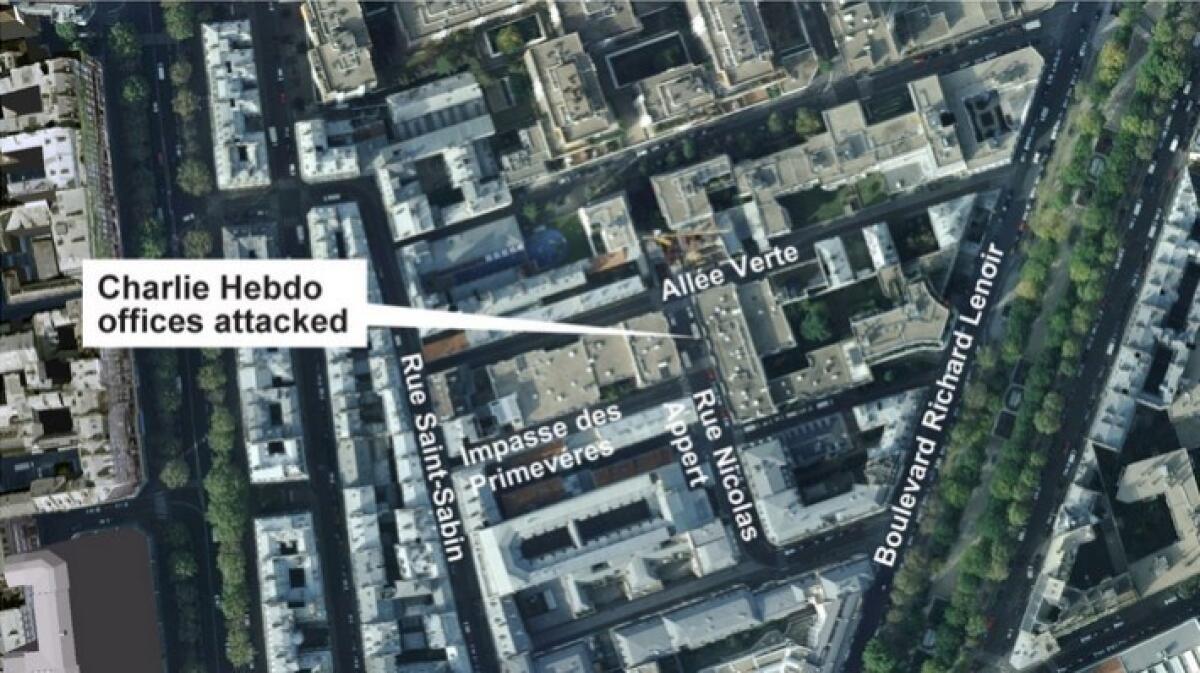Paris rampage live updates: Britain bolsters security; France mourns victims of Charlie Hebdo attack
- Share via
Europeans came out Wednesday night to hold up pens in remembrance of the 12 people killed in a bloody attack at the Paris satirical magazine Charlie Hebdo. Police spent most of the day in a massive manhunt for the three gunmen, and the U.S. and other countries offered assistance.
You are reading Day 1 updates. Go to Day 2 for updated coverage.Britain raises security at ports, border
Britain has increased security at ports and border points after the deadly attack in Paris, though British officials say there is no specific new threat to the country, the Associated Press reported. Prime Minister David Cameron's office says the national threat level remains at "severe," which means intelligence officials believe an attack is highly likely.
France mourns 12 dead in Charlie Hebdo attack
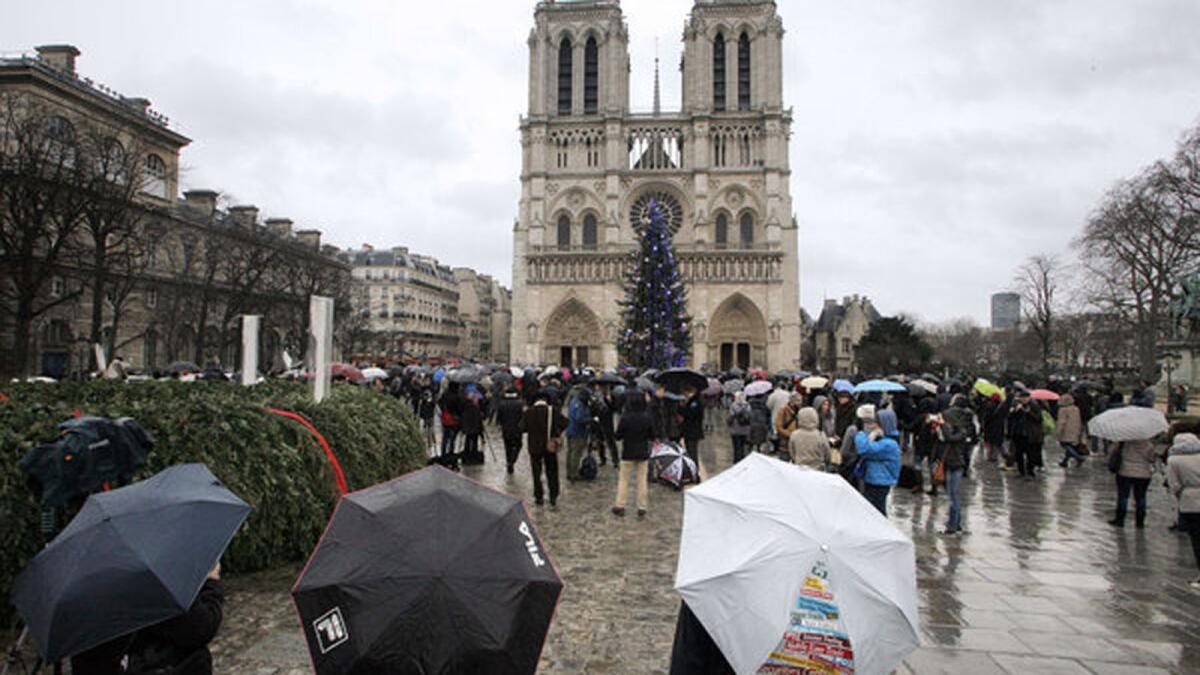
Matthieu Alexandre / AFP/Getty Images
Bells rang out, Paris public transport stood still and children sat silent as France mourned 12 people killed in an attack on the Charlie Hebdo offices. French President Francois Hollande ordered flags at half-staff to honor the victims. Onlookers wept while listening to bells peal at Paris' Notre Dame Cathedral.
Tension mounts as police officer dies in shooting at Paris' edge
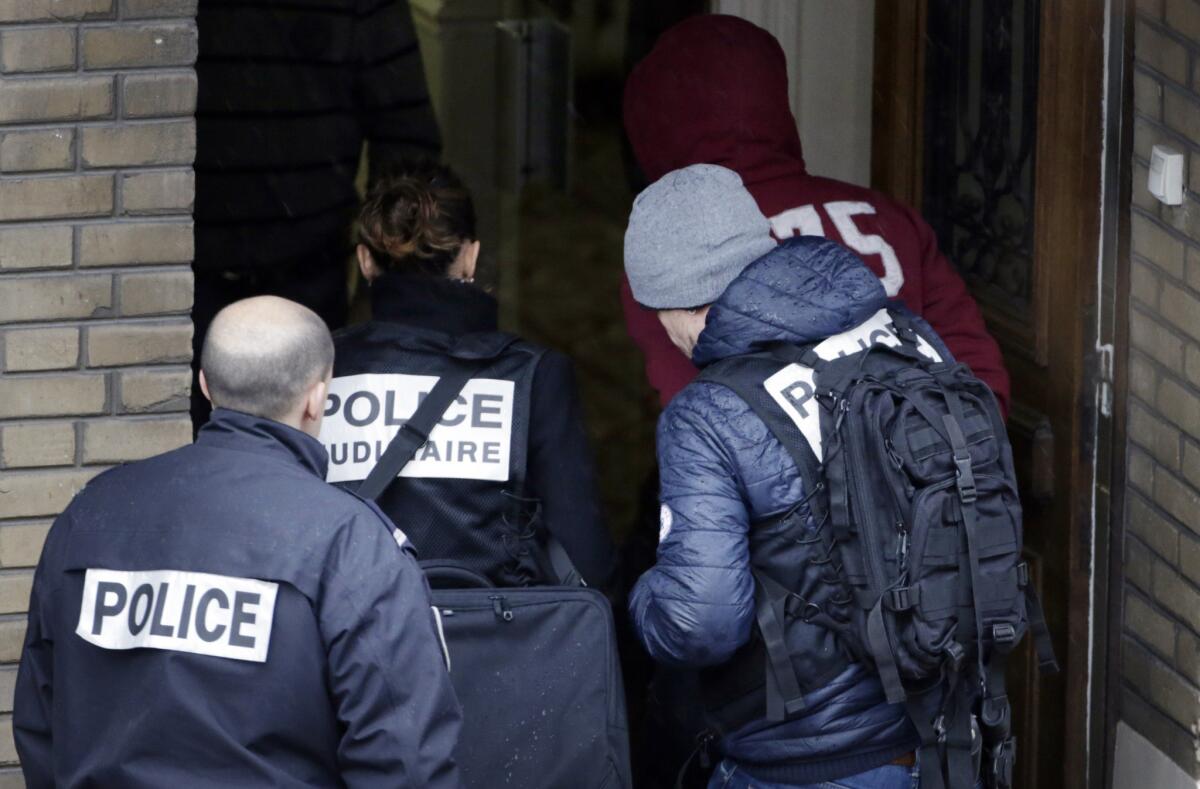
Kenzo Tribouillard / AFP/Getty Images
An assailant opened fire on a police officer on the southern edge of Paris early Thursday, killing her and injuring a nearby street sweeper before fleeing, officials and a witness said. France's interior minister cautioned against jumping to conclusions a day after the deadly assault at Charlie Hebdo offices.
'Several arrests' overnight, French official says
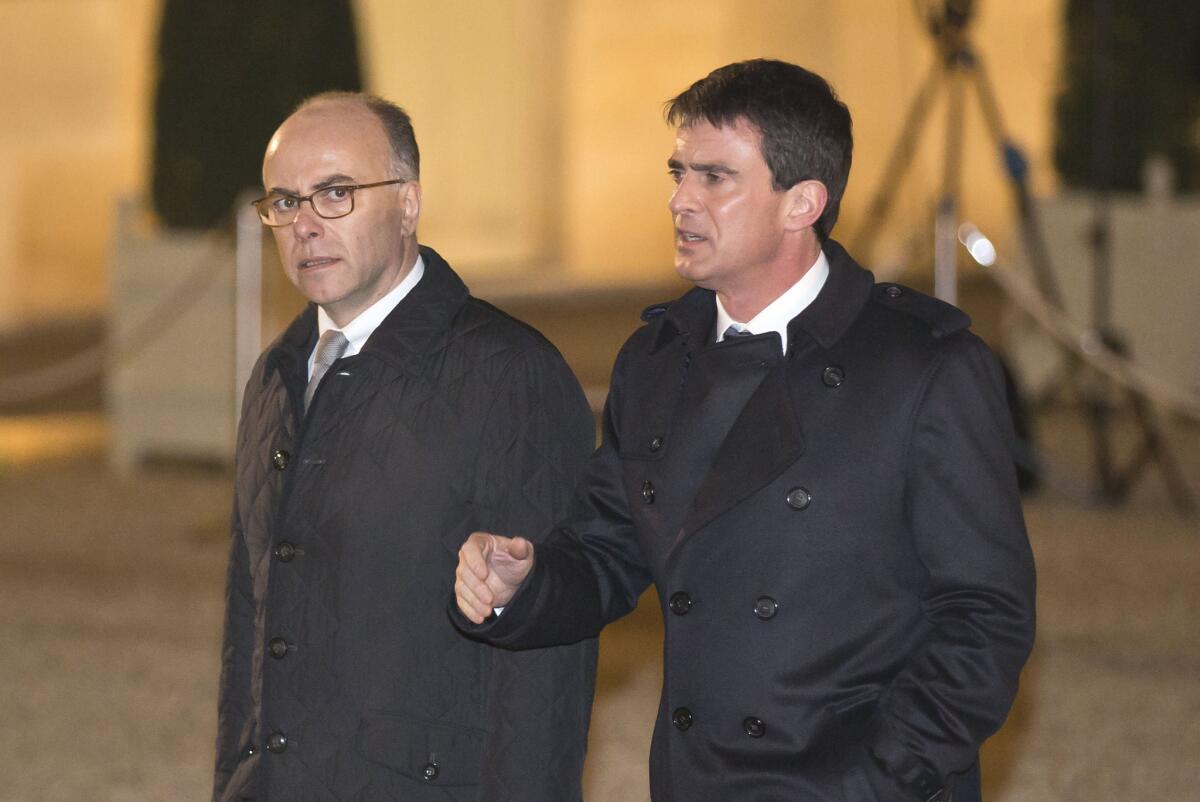
Associated Press
French Prime Minister Manuel Valls, above right, says there were “several arrests” overnight in the hunt for two suspects in the deadly shooting at Charlie Hebdo, the Associated Press reported.
Mourners gather in San Francisco, New York
People attend a vigil in San Francisco's Financial District to show their solidarity with those killed in an attack at the Paris offices of Charlie Hebdo.
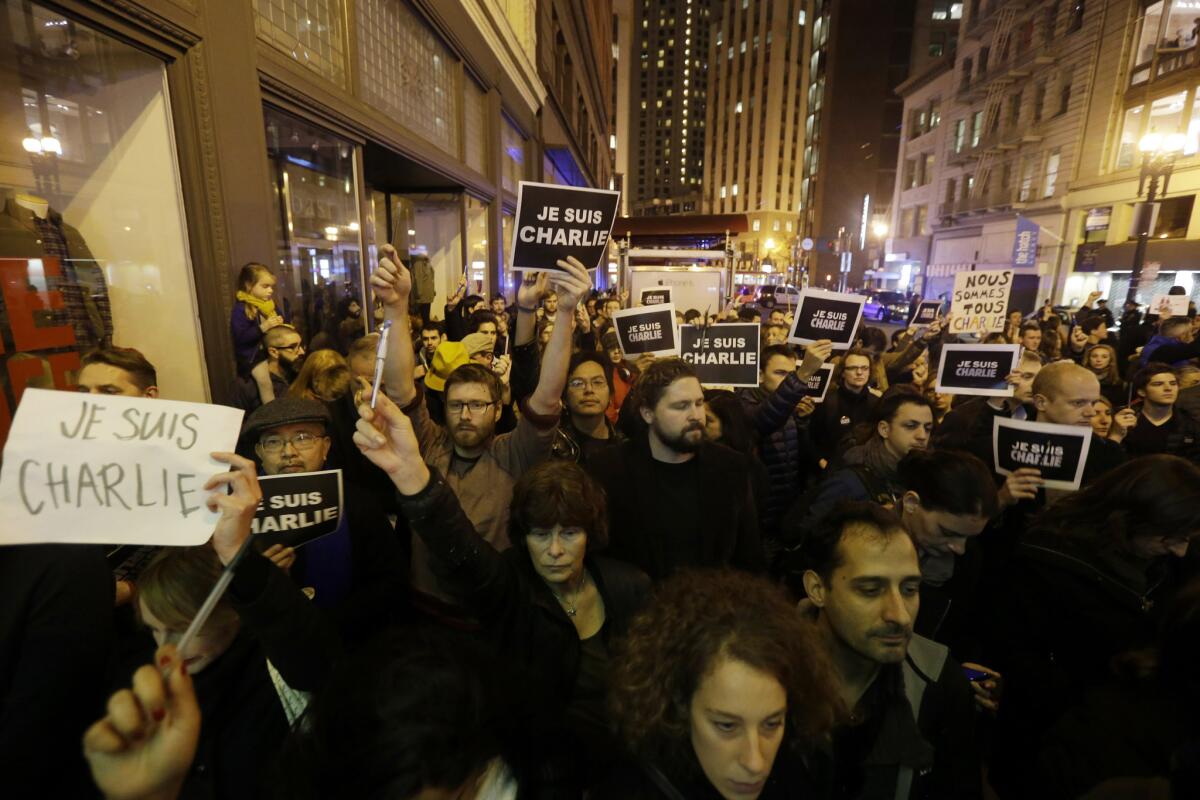
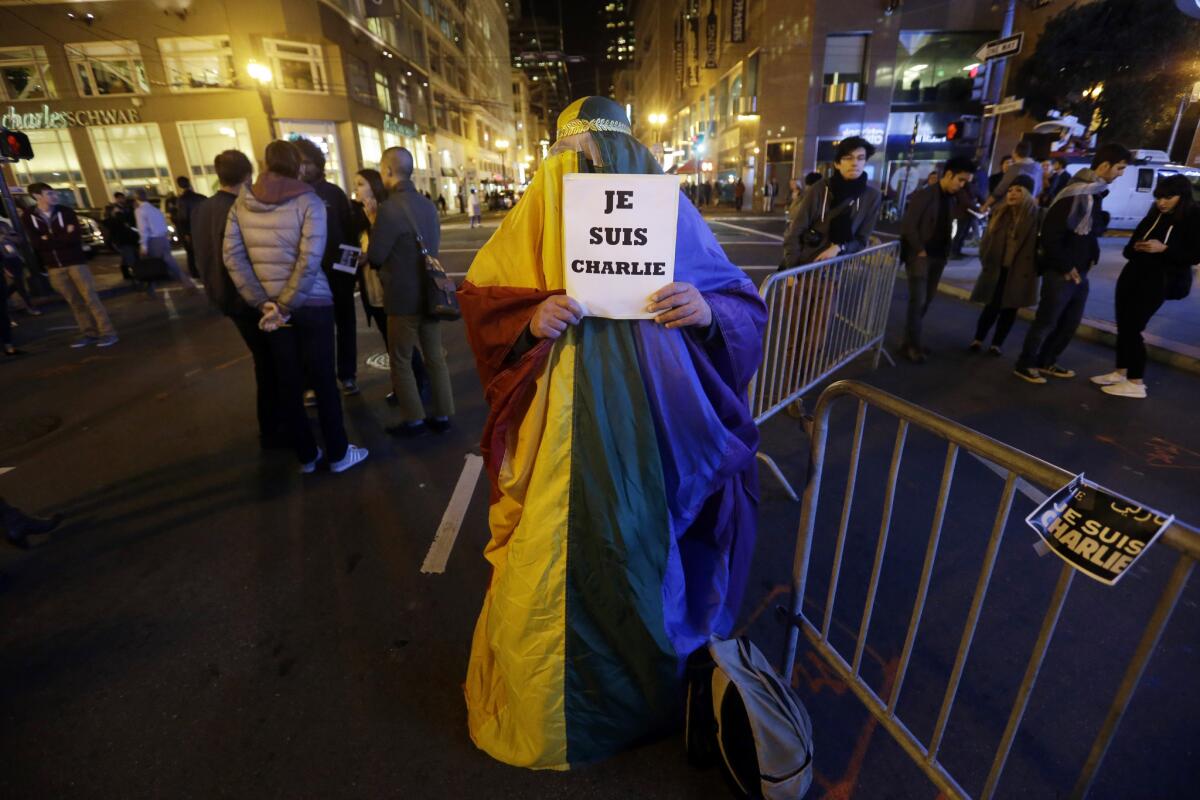
Marcio Jose Sanchez / Associated Press
And at a rally in New York City:
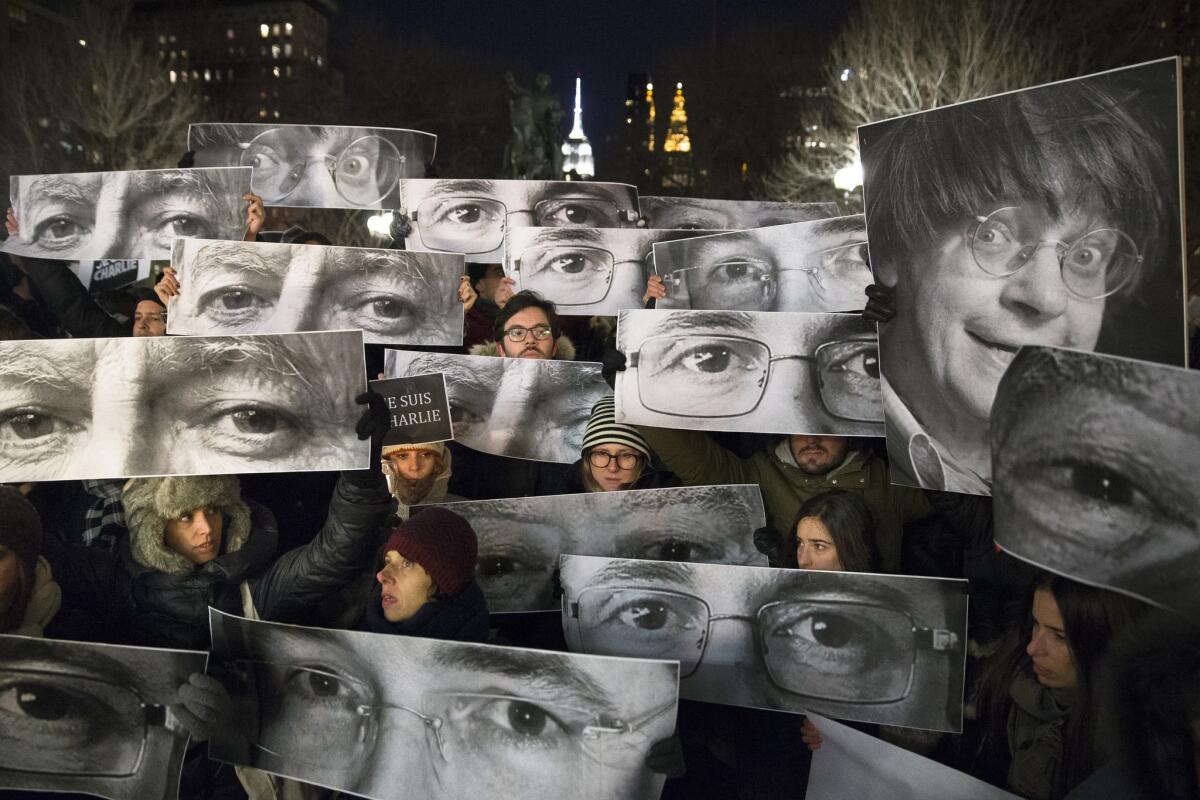
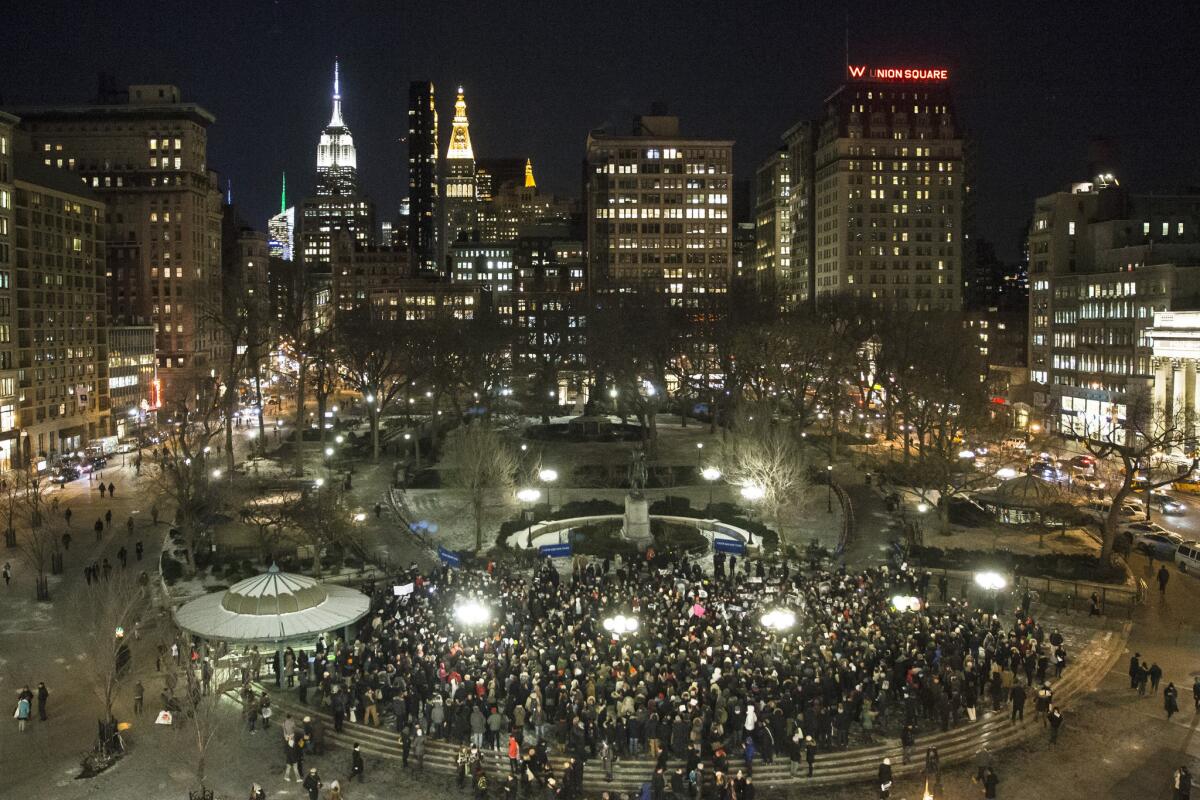
John Minchillo / Associated Press
Sneak peek
Here's the Los Angeles Times' front page for tomorrow.
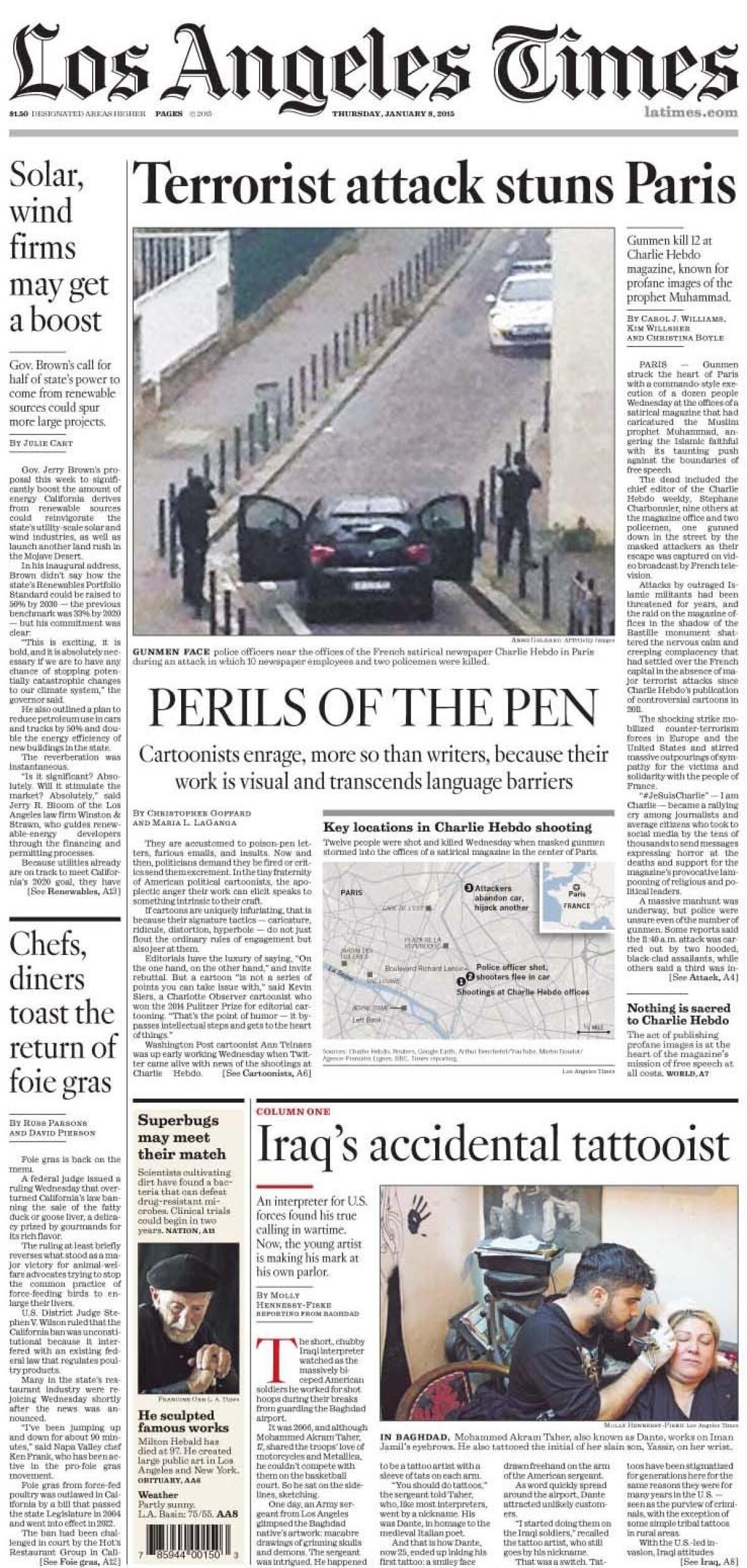
Vigils in South America
People gather in Lima, Peru, to honor the victims of Wednesday's attack on the Paris offices of Charlie Hebdo magazine.
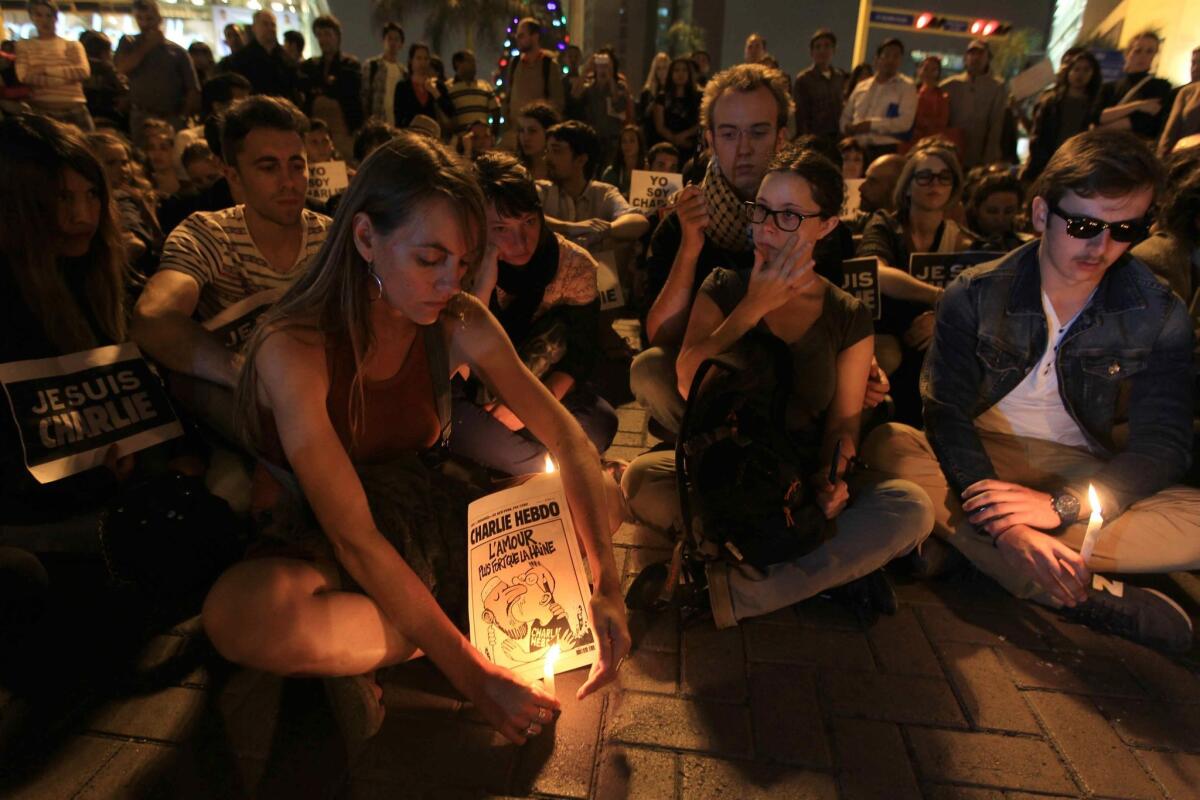
European Pressphoto Agency
In Rio de Janeiro, "I am Charlie" adorns an arm.
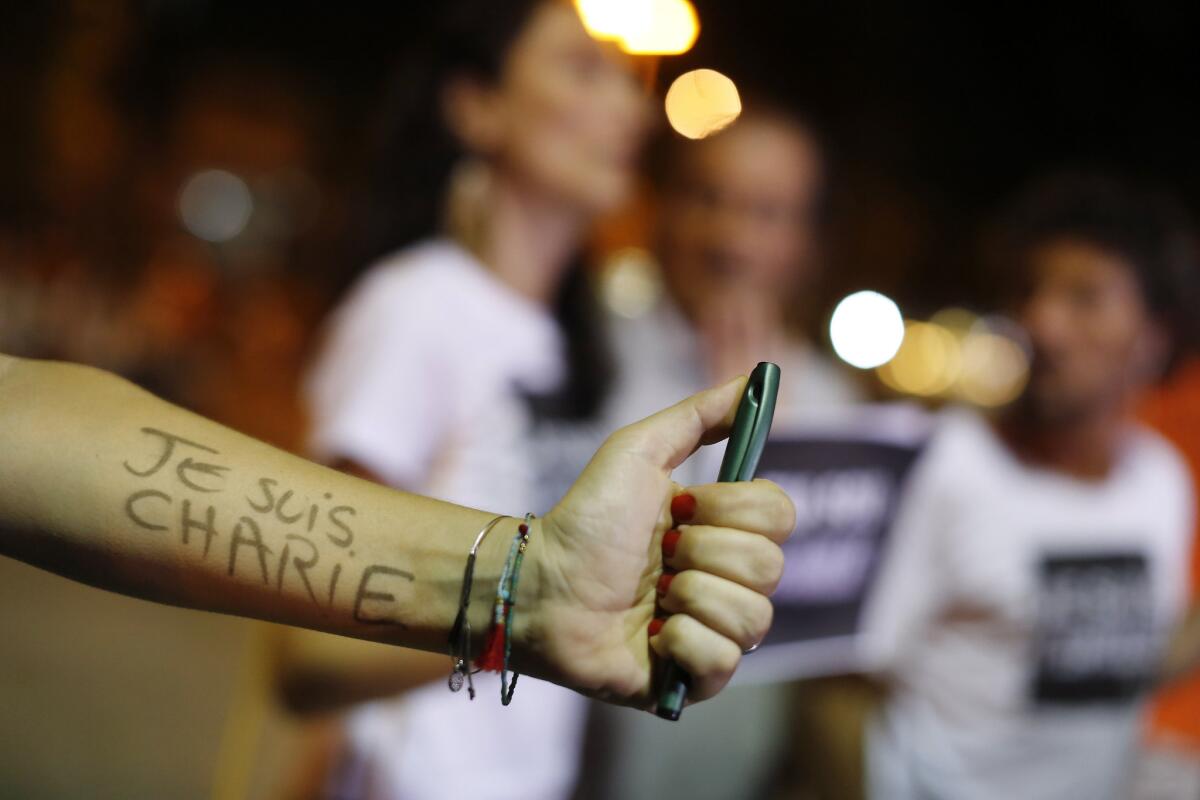
Associated Press
Political cartoonists face perils, especially abroad
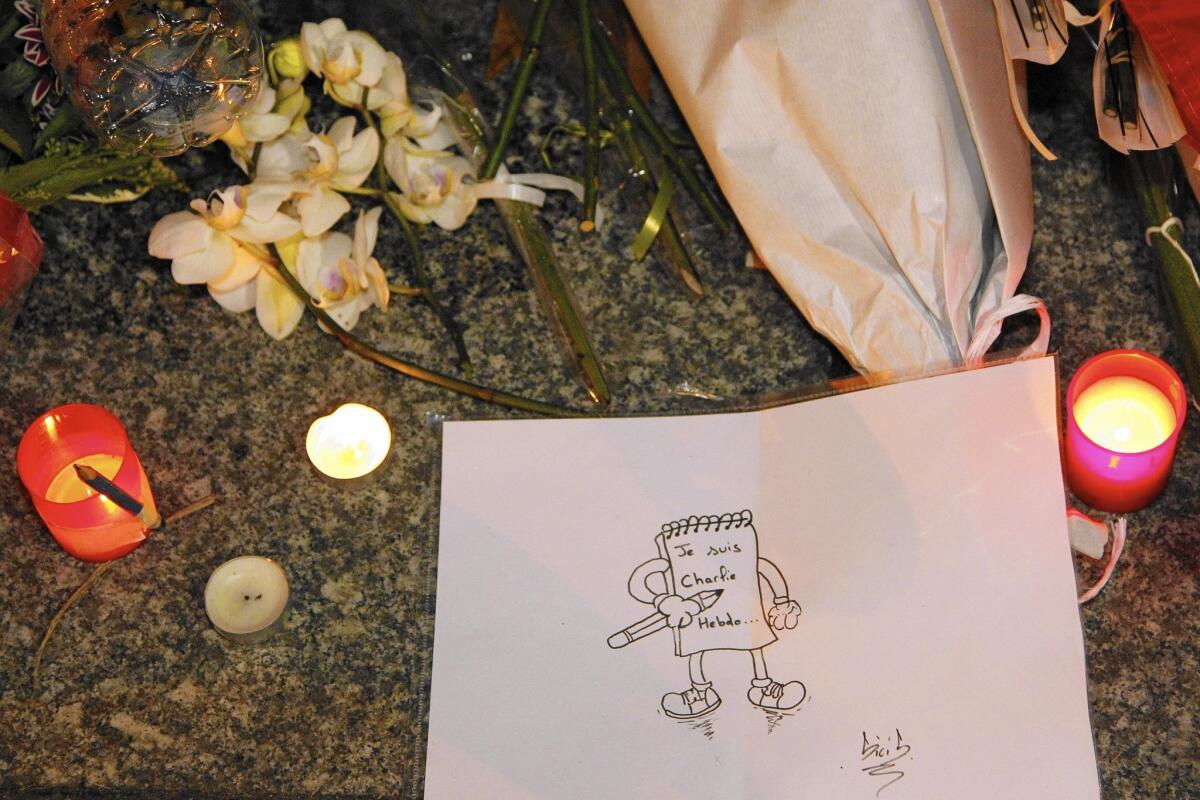
AFP/Getty Images
David Horsey, a two-time Pulitzer Prize-winning cartoonist who now works for the Los Angeles Times, said he once received a death threat in response to his work.
But people who disagree with him, he said, are often his most loyal followers. "They're back every day just to tell me what an idiot I am," he said. "There's not much hate behind it. It's, 'Boy, you're an idiot,' not, 'I'm gonna come get you.'"
On the other hand, he said, editorial cartooning is "a very dangerous job in most parts of the world," citing examples from Russia and Sri Lanka. "We're pretty protected because of the nature of our society. In many parts of the world, doing political cartoons about religious groups or about the government lands you in jail or gets you shot or beat up."
"In Europe and the Middle East, they take cartoons deadly seriously," said Pat Bagley, a cartoonist for the Salt Lake Tribune. "In the U.S., we're more entertainers, and we don't get quite the respect or the response they do."
Ahmed Merabet
Ahmed Merabet, 42, served at a police station in Paris' 11th arrondissement, the neighborhood where Charlie Hebdo’s offices are located, French news reports said.
His death was captured in video broadcast on French television and widely shared on social media sites. The video shows one of the gunmen shooting Merabet outside the magazine offices, then approaching the writhing victim to fire a fatal shot at point-blank range.
He leaves behind a girlfriend.
--David Ng
Franck Brinsolaro
Franck Brinsolaro, 49, was a police officer assigned to protect Charlie Hebdo’s editor, Stephane Charbonnier.
A member of France's Protection Service, which provides security for important people and institutions, Brinsolaro held the rank of brigadier, which is equivalent to a sergeant.
His wife, Ingrid, is the editor in chief of L'Eveil Normand, a weekly news publication in the northwest of France. They have two children, according to a report from the French radio station Tendance Ouest.
Brinsolaro was shot and killed inside the Charlie Hebdo offices, authorities said.
--David Ng
Michel Renaud
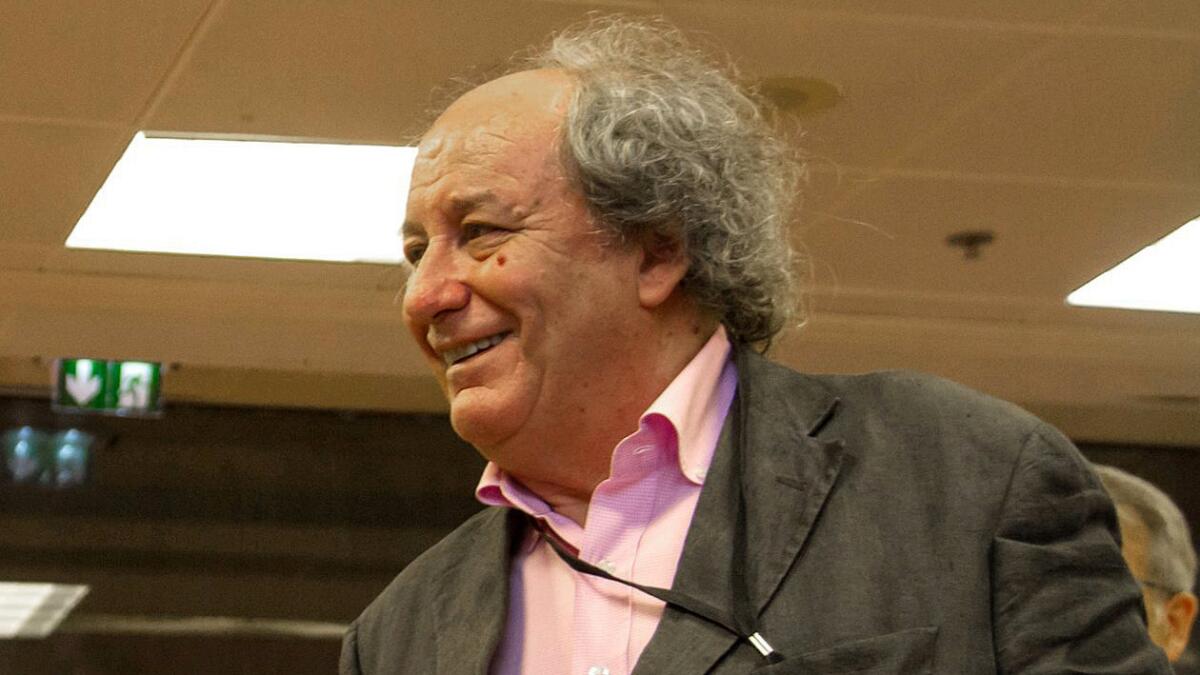
European Pressphoto Agency
Michel Renaud was a founder of a travel expo in the Auvergne region in central France and was reportedly visiting the Charlie Hebdo offices in Paris on Wednesday.
A former journalist for Le Figaro and Europe 1, he left the profession and became a travel expert. He helped to create Rendez-vous du Carnet de Voyage (Travel Book Rendezvous) , a biennial expo of travel writers and enthusiasts who gather in the central city of Clermont-Ferrand.
Renaud was at the Charlie Hebdo office with a colleague to meet cartoonist Jean Cabut, who had previously been a guest of honor at the festival, France 3 TV reported.
Renaud’s colleague, Gerard Gaillard, survived the attack by hiding under a table, according to a report on the Radio France website.
Renaud also worked in local politics, serving as communications director for Roger Quilliot, a longtime mayor of Clermont-Ferrand, and as deputy chief of staff for Serge Godard, another city mayor.
--David Ng
French police release photos of suspects
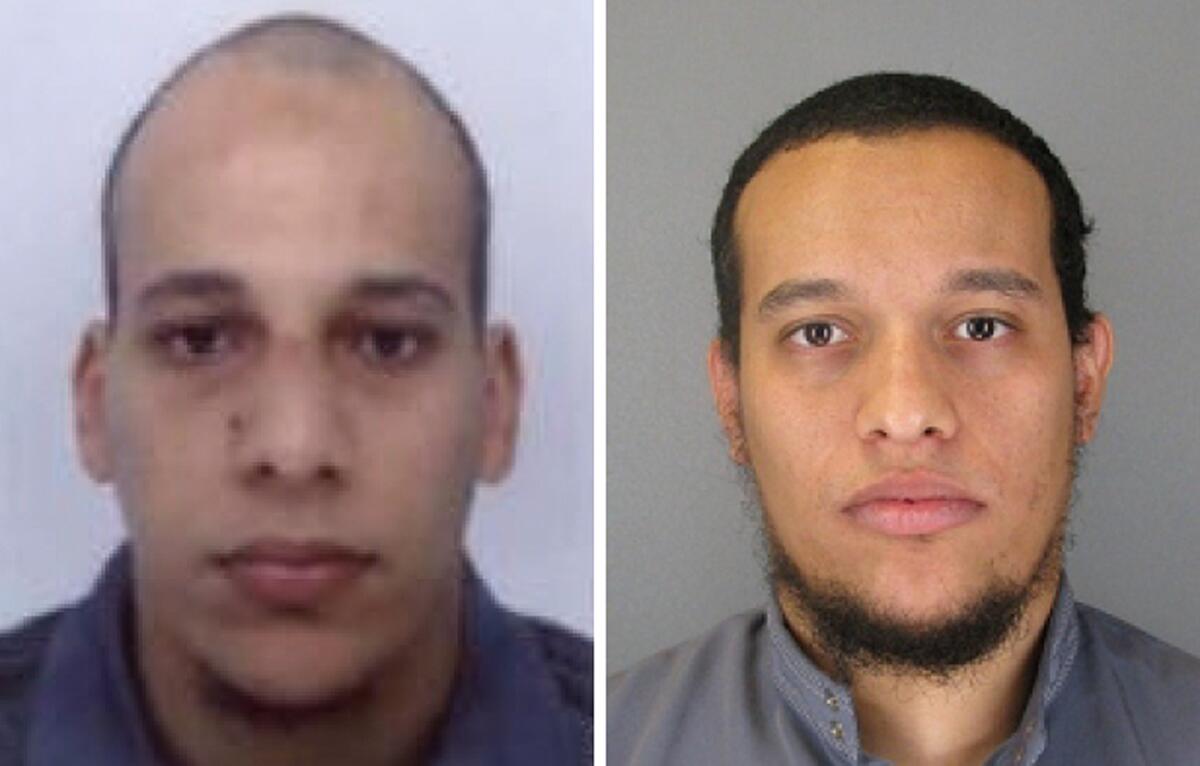
French Police / AFP/Getty Images
French police say brothers Cherif, left, and Said Kouachi are two of the three gunmen who killed 12 people.
Separately, Agence France-Presse reported that the third suspect, 18-year-old Hamyd Mourad, turned himself in to police after learning he was being sought.
L.A. Times editorial: We must defend freedom of expression
The impulse to punish or censor sacrilegious speech isn't unique to Muslims. In the past, Christians also have used the law to punish irreverence, and blasphemy statutes remain on the books in some U.S. states (though they wouldn't survive a 1st Amendment challenge). Even many Americans and Europeans who support free speech in general would draw the line at protection for religiously offensive speech, just as many would make an exception for racist speech.
Yet a moment's reflection should dispel the view that freedom of political speech can be separated from speech about race or religion — subjects that are entwined with politics and government all over the world. In a free society, the answer to offensive speech about any topic is more speech.
Resources offered to Charlie Hebdo
AFP/Getty Images
In the wake of the attack on Charlie Hebdo, three French media institutions announced they would provide the resources necessary to keep the satirical magazine running.
In their announcement, newspaper Le Monde and national public broadcasters Radio France and France Televisions invited all other French media to join them in protecting “the principles of independence and freedom of thought and expression, guarantors of our democracy.”
Above, police guard Radio France’s Paris offices after the attack.
One suspect apparently was arrested in 2005
Cherif Kouachi, one of the men suspected of carrying out the attack on Charlie Hebdo's offices, appears to have been arrested in 2005 for ties to a jihadist recruiter.
According to Bloomberg News, a person of the same name and age was arrested in January 2005 as he prepared to fly to Damascus, Syria. Authorities believed Kouachi to be part of a recruiting ring that sent French Muslims to fight in the Iraqi insurgency against the United States, the news service reported.
Kouachi, who was 22 at the time, had said during trial that he was inspired to join after seeing abuse of detainees at the Abu Ghraib prison in Iraq. Initially, Bloomberg reported, Kouachi had wanted to attack Jewish targets in France, but his recruiter convinced him to focus on Iraq instead.
He was sentenced to three years in prison, but the sentence was partially suspended, Bloomberg reported.
His attorney, Vincent Ollivier, told the Pittsburgh Tribune-Review that Kouachi had been having second thoughts and was relieved to be arrested.
According to the newspaper, Kouachi had spent his whole life in France and was not a strictly observant Muslim - drinking and smoking marijuana.
Kouachi was delivering pizzas for a living at the time, the newspaper reported. Bloomberg later reported he was working at a supermarket. His parents, Algerian immigrants, were both dead, Ollivier told the Tribune-Review.
Slain police officers are named
The Paris public prosecutor, Francois Molins, identified the two slain police officers as Franck Brinsolaro and Ahmed Merabet.
Brinsolaro was assigned to protect the editor of Charlie Hebdo, according to police union representatives. Merabet was killed outside the building on Boulevard Richard Lenoir as the gunmen fled.
It is Merabet who can be seen in videos showing the hooded attackers running back to shoot an officer in the head, before they sped off in a black Citroen.
Two other police officers were injured, Molins said.
--Kim Willsher
Suspects' status unclear
There are conflicting reports about whether the suspects have been apprehended. NBC News is citing unnamed U.S. officials as saying two had been detained and a third killed. Le Monde is citing police sources as saying the suspects are still at large.
Meanwhile, there are numerous reports of heavily armed officials conducting operations in the city of Reims, east of Paris, apparently searching for the suspects.
Bernard Maris
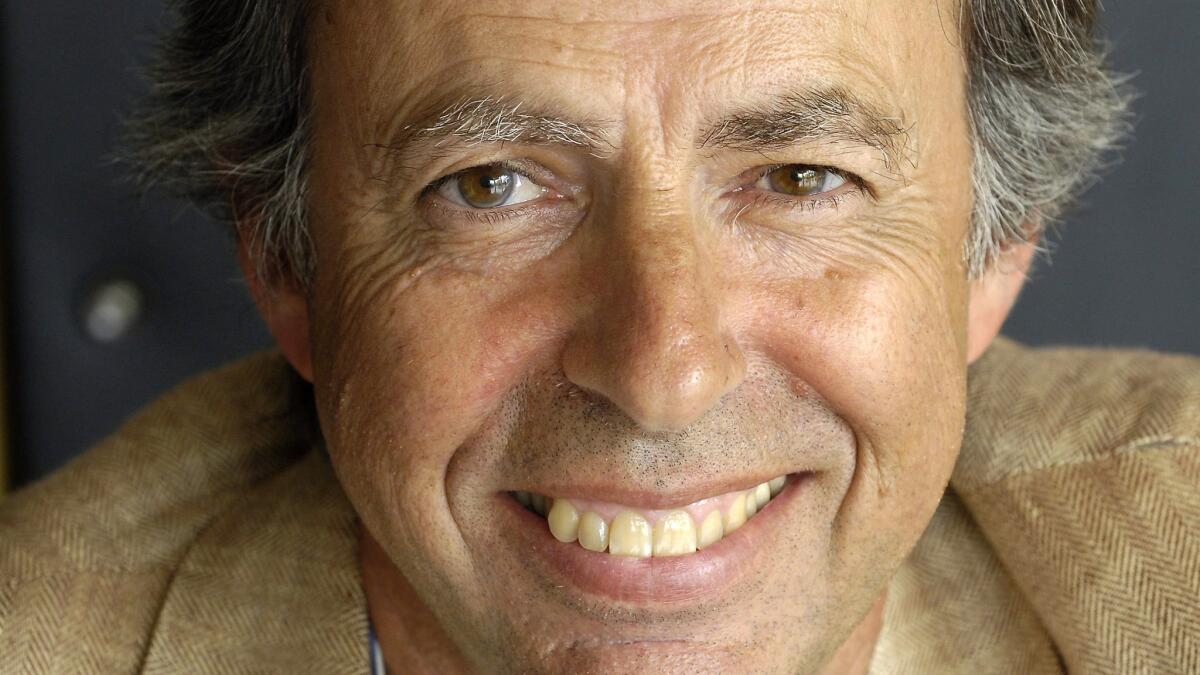
Christophe Abramowitz / France I/EPA
A noted Keynesian and political maverick, Bernard Maris, 68, was a widely read public figure who also appeared frequently on French television and radio, debating about economics and politics. He was a regular contributor to Charlie Hebdo.
Maris’ political beliefs could be difficult to pigeonhole. He was sometimes categorized with “alter-globalization” advocates, who believe in some forms of global cooperation but oppose many of the effects of economic globalization. At the same time, he was lumped together with environmentalists and the Green party. He was also a member of the governing board of the Bank of France.
He told Le Monde in September that French President François Hollande "is perhaps still on the left, but he's no longer socialist. The socialist dream, which consisted of prolonging the great revolution of human rights and freedom on a social scale, has vanished with him."
He added, "If it's not dead, the left is quite sick."
Maris' many interests also included the novels of the controversial French author Michel Houellebecq, on which he recently published a book exploring the economic dimensions of the novelist's body of work.
"Capitalism is a system based on immaturity and it can't last forever," Maris told the Nouvel Observateur last year. "It's only been 200 years, after all. That's nothing on the timeline of mankind."
--David Ng
'Banksy' account responds to Paris attack
'They knew the men they were hunting'
The gunmen entered the Charlie Hebdo offices “and called, name by name, the editor and some of the caricaturists, the most famous, and they were shot [in] the head,” Paris Deputy Mayor Patrick Klugman said in a video posted by ABC.
“It was not a riot,” he said. “It was clearly an execution. They knew the men they were hunting.”
Bernard 'Tignous' Verlhac
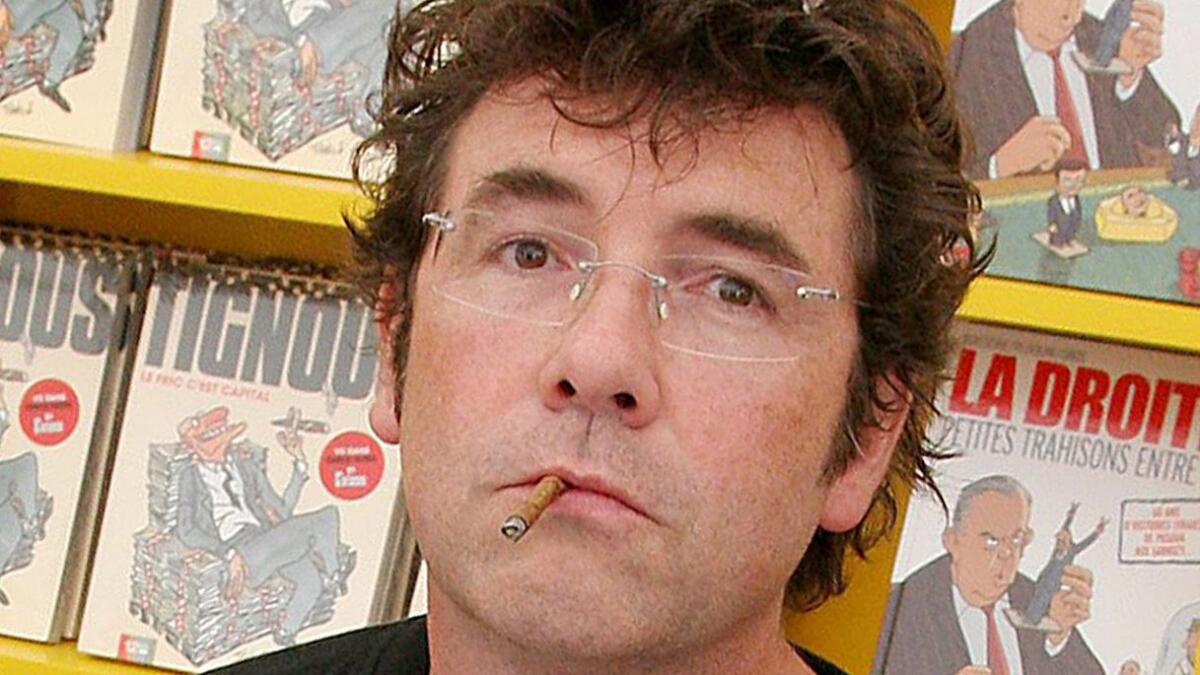
Tim Somerset / EPA
Like several of his colleagues, cartoonist Bernard Verlhac, 58, went by a nickname: “Tignous.”
The father of four drew his first cartoon when he was about 13, according to remarks published by the French Embassy in Colombia when Verlhac visited the country in 2010. His first published drawing was done for a striking labor union to which his father belonged.
“My father worked nights at the post office,” Verlhac said, according to the embassy. “He went on strike to warn about the destruction of public services, a fight that still exists today, and he wanted a poster.”
Verlhac went on to become a prominent satirist for Charlie Hebdo and other publications. “The best cartoons give rise to laughter, thought and set off a certain kind of shame,” Verlhac was quoted as saying.
Before his death, Verlhac was preparing to publish a new book about prisons with Dominique Paganelli, who called Verlhac a man of “extreme kindness” and “tremendous tenderness,” according to the French newspaper Le Figaro.
Gunmen 'went straight for Charb'
Christophe Crepin, a police union spokesman in Paris, said the gunmen targeted Charlie Hebdo editor Stéphane “Charb” Charbonnier when they entered the magazine’s offices, according to the Associated Press.
The gunmen "went straight for Charb and his police bodyguard, killing both immediately with automatic weapons, then firing on others," AP quoted Crepin as saying.
Sharing thoughts at Trafalgar Square vigil
People from France attend a vigil at Trafalgar Square in London and share thoughts on Wednesday's Paris shooting.
Former Charlie Hebdo publisher: 'I've lost all of my friends today'
In an interview with France Inter radio, Phillipe Val, former publisher of Charlie Hebdo spoke about the shooting at the magazine.
According to a Guardian interpretation, he said: "I've lost all of my friends today." He went on to describe those who died in the shooting as "very good people" who "loved to make people happy, to make them laugh," according to the interpretation.
"It might be good if tomorrow, all newspapers were called Charlie Hebdo. If we titled them all Charlie Hebdo. If all of France was Charlie Hebdo," the interpretation reads.
Cartoonists respond to Charlie Hebdo attack
Cartoonists have been commenting on the attack in Paris with powerful illustrations. The Los Angeles Times’ Opinion staff has rounded up some of the more poignant takes.
Three suspects identified
A police official, speaking on condition of anonymity, said investigators believe they have identified three suspects: two French brothers, ages 34 and 32, and an 18-year-old whose nationality was not immediately clear. There were conflicting reports about whether the suspects had been apprehended.
According to the Associated Press, two French police officials named the suspects as Said Kouachi, Cherif Kouachi and Hamyd Mourad.
--Kim Willsher
'I am Charlie'
Demonstrators at Place de la Republique in Paris:
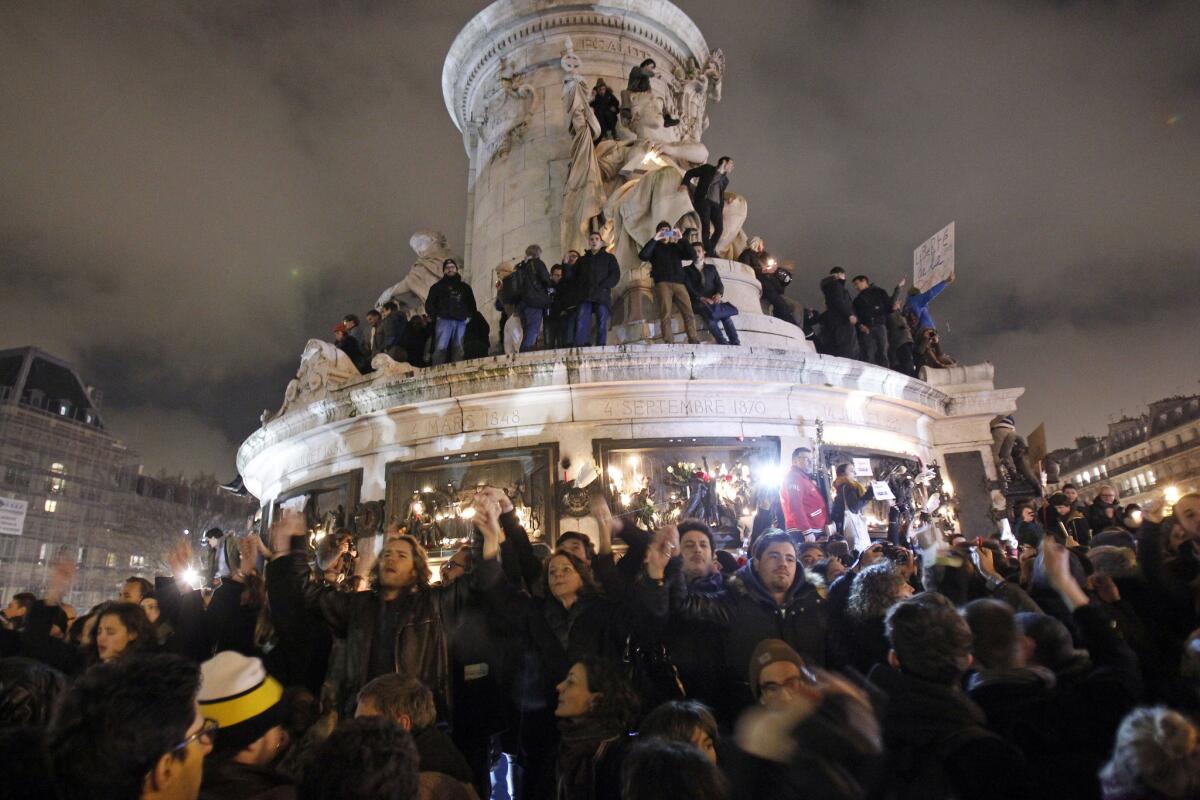
Getty Images
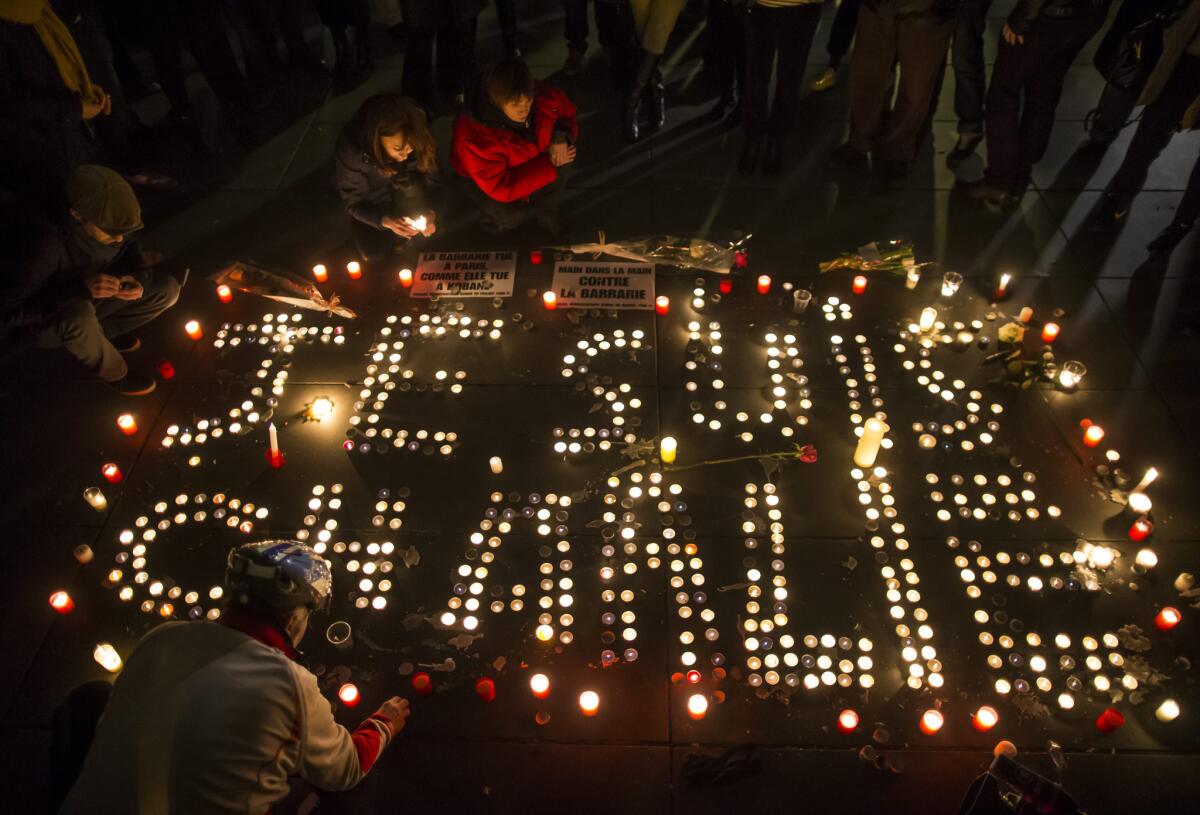
European Pressphoto Agency
And in Lyon, France:
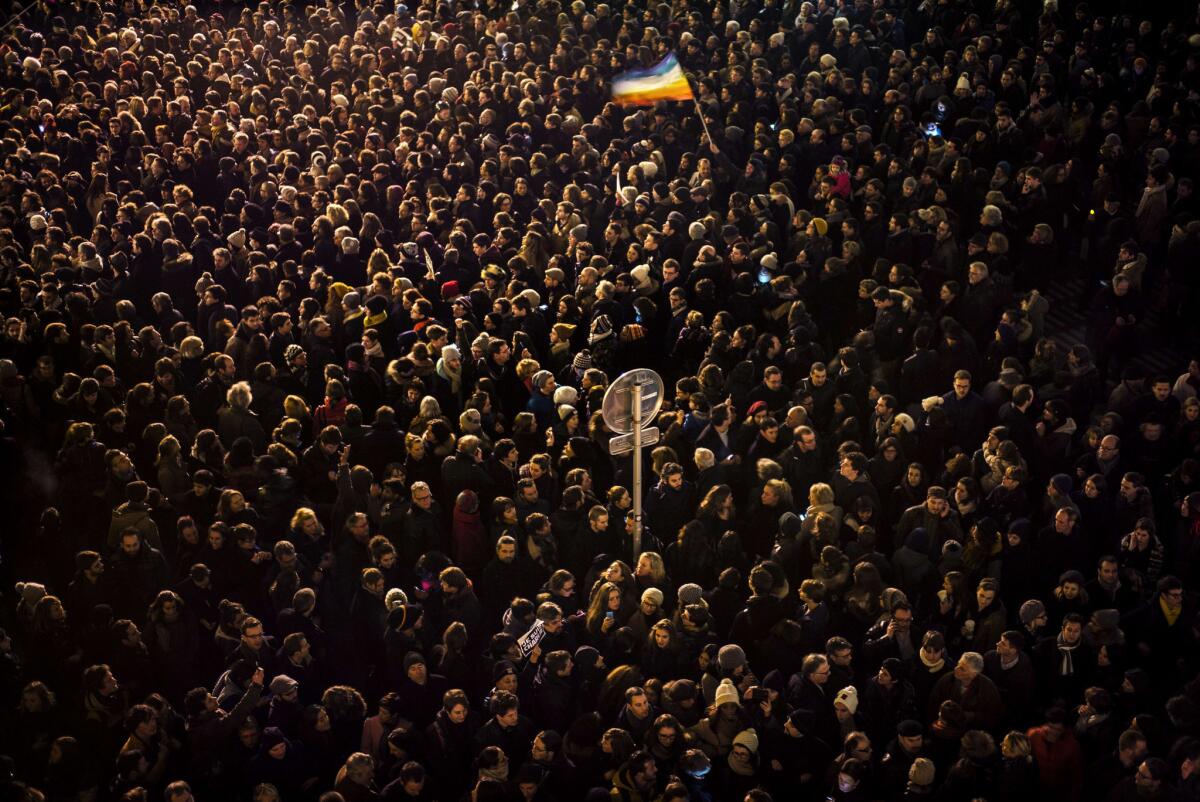
AFP/Getty Images
France declares day of mourning
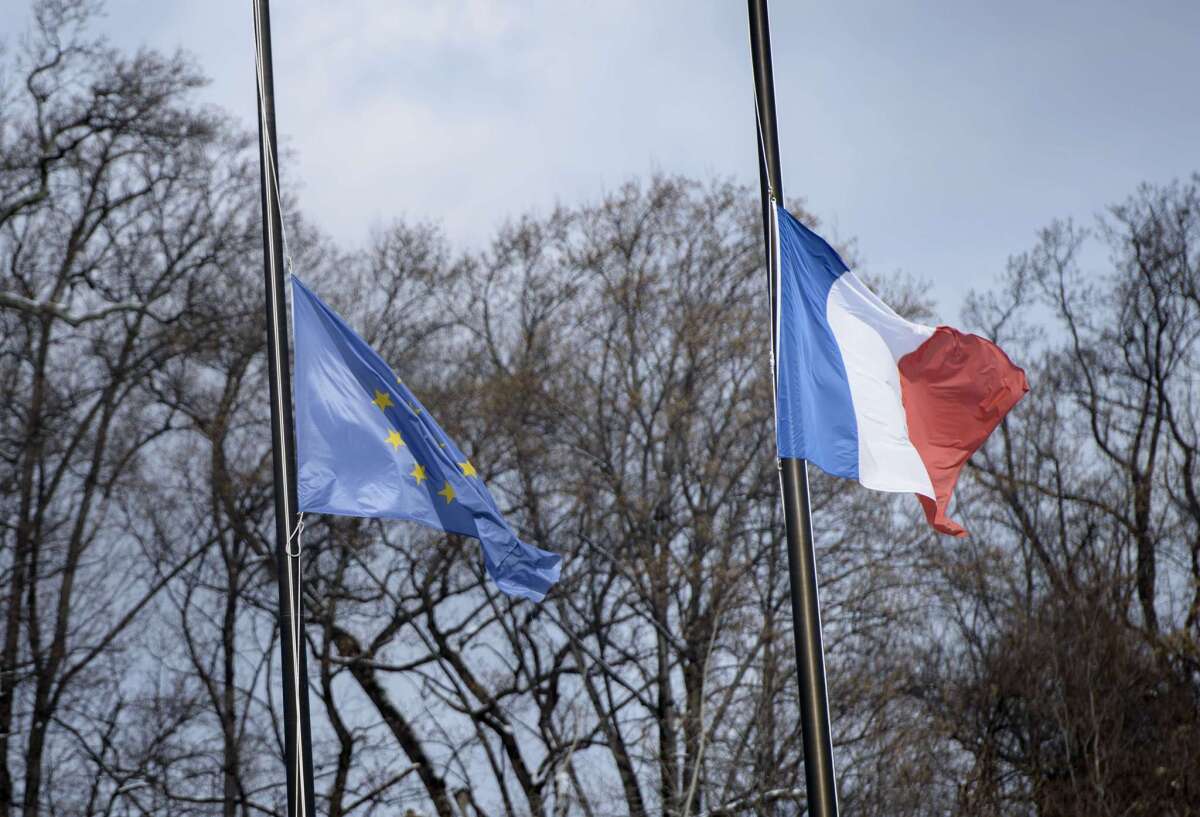
AFP/Getty Images
French President François Hollande declared a day of mourning Thursday. There will be a moment of silence at 12 p.m. in government offices and Hollande urged that flags be flown at half-mast for three days.
What Charlie Hebdo's name means
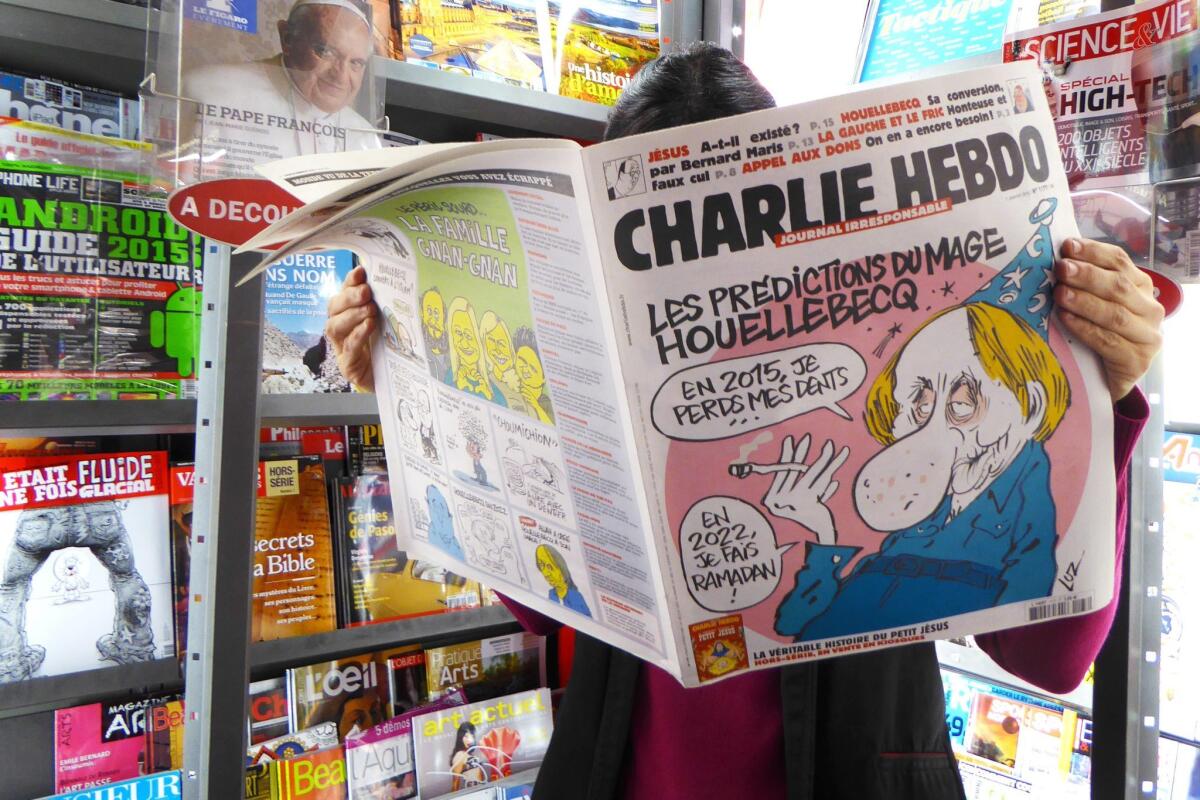
European Pressphoto Agency
Charlie Hebdo began in 1969 as a magazine named Hara-Kiri, a reference to the Japanese form of ritual suicide. From the start, it invited controversy. A cover after the death of French president Charles de Gaulle came just a week after a massive fire killed more than 140 people in a nightclub; the magazine mocked news coverage of the events with a headline that read, in part: “One dead.”
Hara-Kiri was banned, but it didn’t go away. Maintaining the same group of people, the publication became Charlie Hebdo. “Charlie” was a not-so-subtle reference to the De Gaulle controversy, as well as a nod to the “Peanuts” character Charlie Brown. “Hebdo” was a dimunitive of “hebdomadaire,” or “weekly.” It closed in 1981, but a group of disaffected cartoonists and a stand-up comic revived it in 1992.
Georges Wolinski
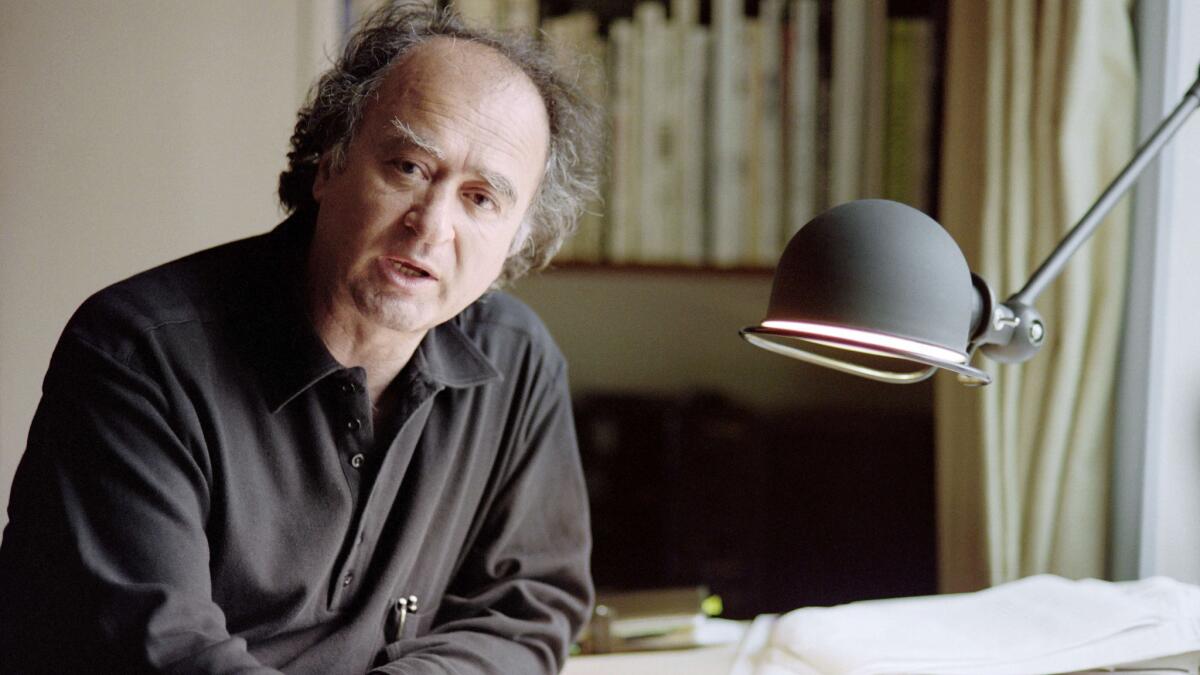
AFP / Getty Images
Georges Wolinski, 80, a cartoonist at Charlie Hebdo, was widely known for his racy and sometimes transgressive illustrations that earned him admiration among French journalists and the public at large.
His drawings encompassed a wide range of subjects, but he specialized in contemporary sexual mores, with a focus on women, and current affairs. He was also a published author, with a new graphic novel, “Le Village des femmes,” that was released in September.
Wolinski , or “Wolin” among friends, joined Charlie Hebdo in 1969 and later became an editor of Charlie Menseul, a monthly publication. He also drew for several other French publications, including Le Nouvel Observateur, L' Humanite, Paris Match and the Journal du Dimanche.
He once said when asked about death: “I want to be cremated. I told my wife: You will throw my ashes in the toilet, that way I will see your ass every day.”
Born in Tunisia, Wolinski was Jewish and lived in North Africa until the age of 13.
“My job is to look for ideas,” he told L'Humanite in 2011. “I've spent all my life looking for ideas like a pig looks for truffles. To search means being able to avoid thinking, re-assessing, being scared. It's reassuring to search.”
--David Ng
Jean 'Cabu' Cabut
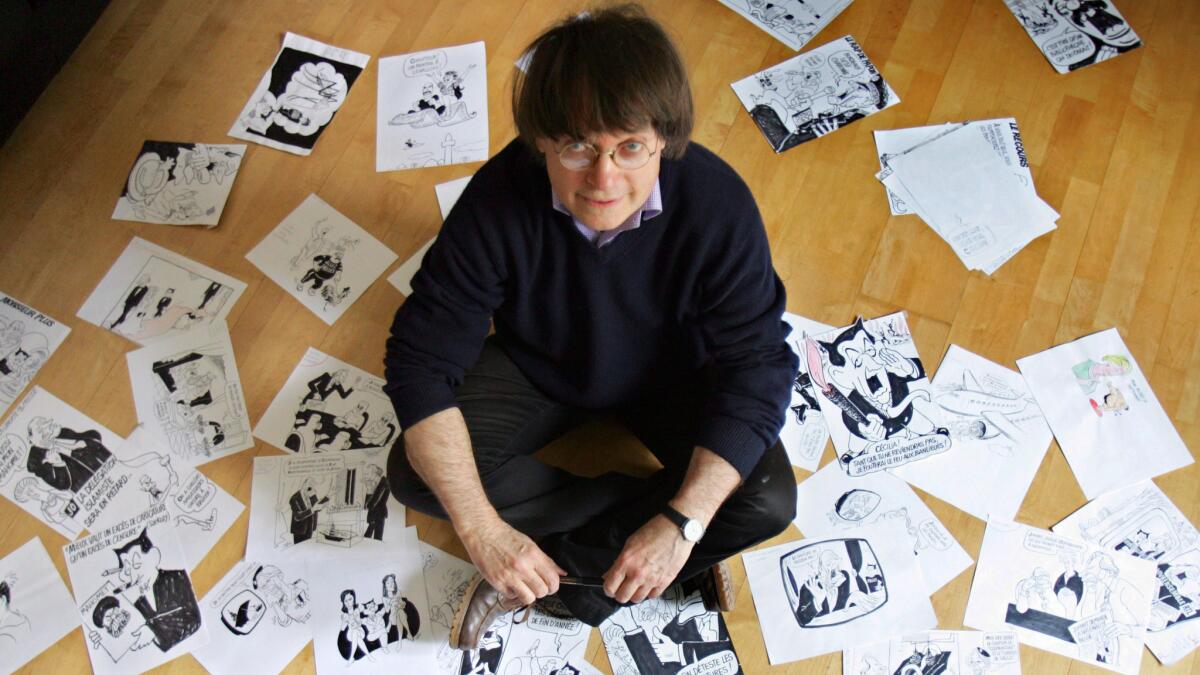
Joel Saget / AFP / Getty Images
Jean Cabut, known as Cabu, was born Jan. 13, 1938, in Châlons-sur-Marne, a small town east of Paris, according to the Bibliotheque Centre Pompidou, a public library in Paris.
“I’ve been drawing for as long as I can remember,” Cabut said, according to the library’s biographical sketch. He began his work at least as early as age 13, when he drew for his school paper and local daily paper, L’Union, for whom Cabut worked until 1961.
Cabut served in the military in the 1950s during Algeria’s fight for independence from France. The brutal conflict later fed his “anti-militarism,” Cabut told the French magazine L’Edition du Soir. The artist would base one of his characters on an official he met during the war.
After leaving Algeria, Cabut went on to draw for various publications, including the controversial and highly offensive French satirical magazine “Hara Kiri”—named after a Japanese form of suicide that involves plunging a knife into the stomach—from 1962 to 1972. From 1977 to 1987, he worked on the youth-oriented TV show “Récré A2.”
Cabut helped to relaunch the Charlie Hebdo title with some friends in 1992, according to the library’s biography of the artist, who continued work for a satirical publication called “Le Canard enchaîné,” the chained duck.
The French newspaper Le Monde said Cabut’s death “leaves a gaping void in the world of cartoonists” and that Cabu was “one of the giants of the genre.”
Stéphane 'Charb' Charbonnier
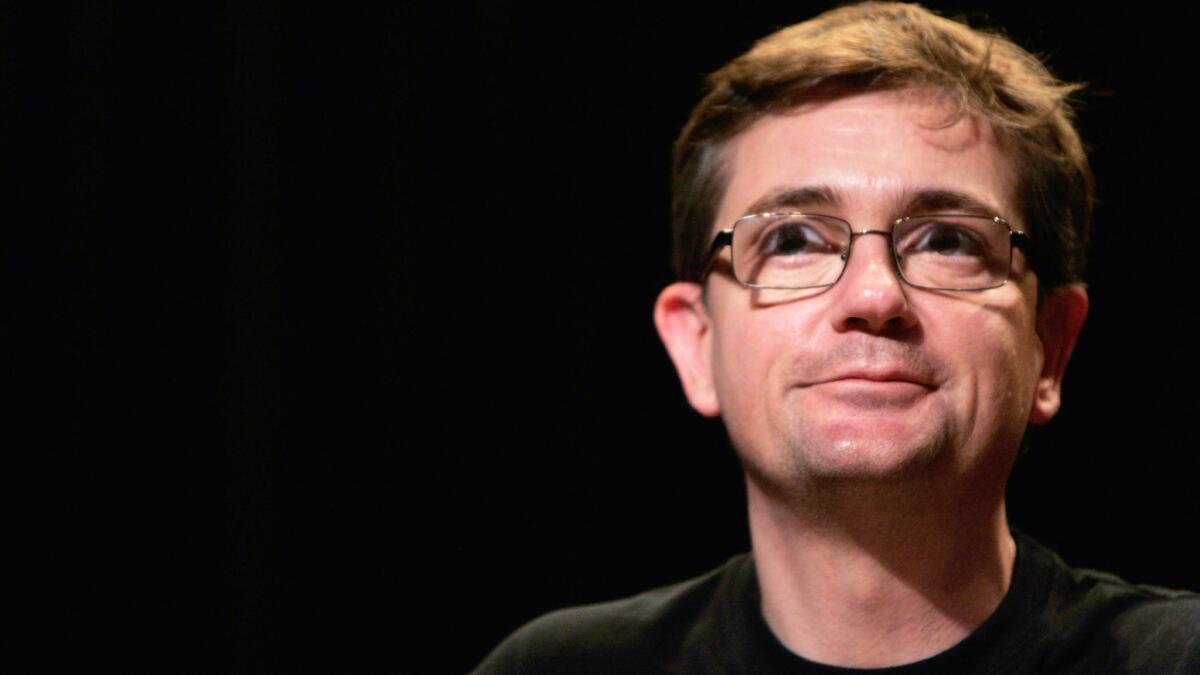
Franck Prevel / Getty Images
Stéphane Charbonnier, the soft-spoken editor of Charlie Hebdo and a cartoonist popularly known as “Charb,” has held his position since 2009.
“It just so happens I'm more likely to get run over by a bicycle in Paris than get assassinated,” Charbonnier said in a 2013 interview with the Los Angeles Times at his office in Paris, which lacked signage after a series of threats and attacks against the left-leaning paper.
Charbonnier conceded that it would be harder to do his often-incendiary work if he had a family to worry about. But he stood on principle.
“If one person is injured or killed, it doesn't mean all of France will be put on its knees,” Charbonnier told The Times. “It's not Islam attacking France, it's one person attacking another person, that's all.… If a small group of terrorists, however small it is, starts to dictate its law to newspapers in France or elsewhere, that would really be a shame.”
Charbonnier added: “It's not exactly our drawings that have power, it's our stubbornness — a stubbornness to continue doing what we feel like doing, through drawing.... It comes from the fact that I have nothing else. The only thing we have is our freedom of speech. If we give up on that, we'd need to change fields. Do other things.”
‘A cartoonist shouldn't have to look over his shoulder’
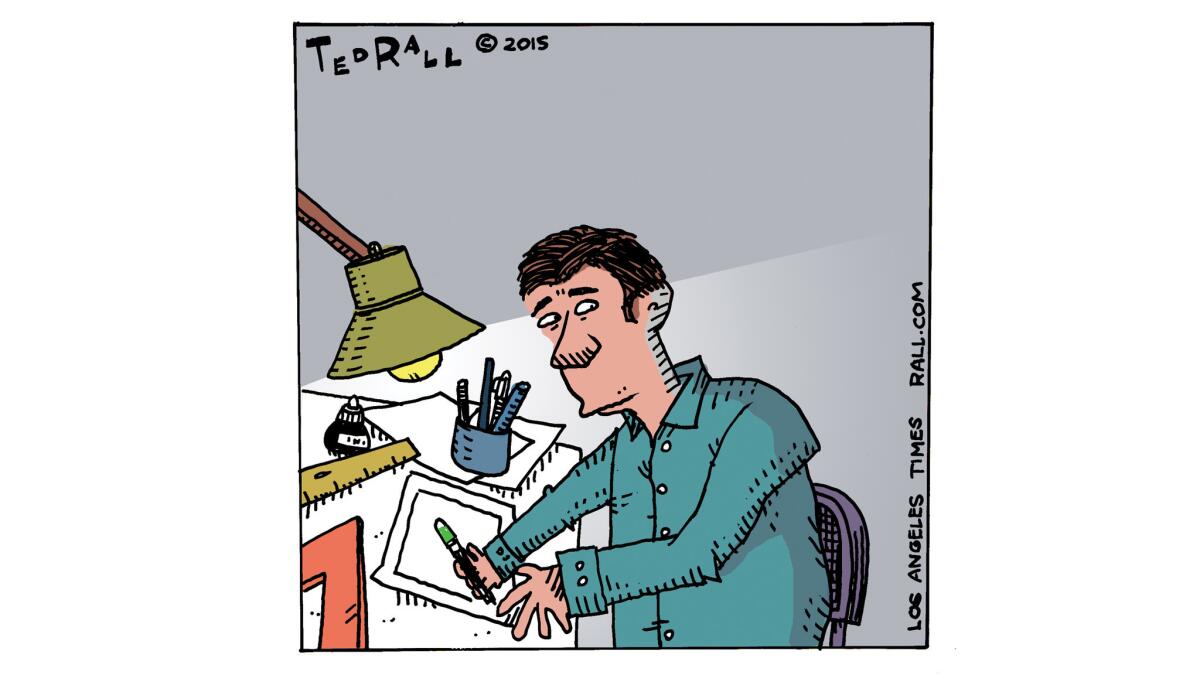
Ted Rall / For The Times
American editorial cartoonist Ted Rall, whose work is regularly featured in the Los Angeles Times, met a group of Charlie Hebdo cartoonists in recent years, including one of Wednesday’s victims. He shares his thoughts:
Every political cartoonist takes a risk to exercise freedom of expression.
We know that our work, strident and opinionated, makes a lot of people very angry, and that we live in a country where a lot of people have a lot of guns. Whether you work in a newspaper office guarded by a minimum wage security guard or, as is increasingly the norm, in your own home, you are always one pull of a trigger away from death when you hit "send" to fire off your cartoon to your syndicate, blog or publication.
Which brings me to my big-picture reaction to Wednesday’s horror:
Cartoons are incredibly powerful.
A defiant Stephane Charbonnier interviewed in 2012: 'We have no choice' but to publish
Six months after assailants firebombed Charlie Hebdo's Paris offices, editor Stephane Charbonnier insisted the weekly would keep publishing.
"We have no choice. If we stop publishing we are all dead," he said in a 2012 interview with Cartoonists Rights Network International. "We can't live in a jail," he added of ceasing publication, "so we continue."
Charbonnier is among the dead in the attack.
In the interview, Charbonnier acknowledged harsh criticism from religious leaders who labeled the magazine's content blasphemy.
"If you are threatened by a drawing, then your god is very small," he said. "If you can't attack or critique god, then you can't attack or critique Marx, or Lenin or Plato."
Violence and religion
French President Hollande addresses the nation
President Francois Hollande vowed the perpetrators would be captured and punished.
“Freedom will always be stronger than barbarism,” Hollande said, adding that France has always been able to overcome difficulties and counter assaults on its most dearly held values.
“We must be aware that our best weapon is our unity, the unity of all of our citizens. Nothing can divide us. Nothing must separate us from one another,” the president stated.
Some of the dead identified
According to police, among the dead are Bernard Maris, an economist and regular contributor to the magazine, and cartoonist Georges Wolinski, who also worked for Paris Match magazine.
The editor of Charlie Hebdo, Stephane Charbonnier, was earlier reported among the dead.
Bernard Maris is pictured below.
More legal run-ins with Christians than Muslims
Since it was founded 19 years ago, Charlie Hebdo's editor told Le Monde, his paper has been sued 13 times by various Catholic organisations, offended by the depiction of Christianity—but only once by Muslim groups, which went after Charlie Hebdo over the 2006 caricature issue and lost the case.
Worldwide vigils for Charlie Hebdo shooting victims
U.S. Muslim groups condemn Paris attack
Muslim advocacy groups across the U.S. joined the chorus of voices condemning an attack on a satirical magazine in France that left 12 people dead on Wednesday, calling the morning shootings “cowardly” and “inhumane.”
Nihad Awad, executive director of the Washington D.C. based Council on American-Islamic Relations, said the attacks at Charlie Hebdo in Paris were not representative of the larger Muslim community and asked for understanding in the wake of the bloodshed.
“We strongly condemn this brutal and cowardly attack and reiterate our repudiation of any such assault on freedom of speech, even speech that mocks faiths and religious figures,” Awad said in a statement. “The proper response to such attacks on the freedoms we hold dear is not to vilify any faith, but instead to marginalize extremists of all backgrounds who seek to stifle freedom and to create or widen societal divisions.”
Dr. Nasim Rehmatullah, vice president of the Ahmadiyya Muslim Community, a national faith-based advocacy group, said the attacks were in direct contradiction to Muslim teachings.
“Nothing justifies this barbaric and inhumane attack,” said Dr. Nasim Rehmatullah, National Vice President of Ahmadiyya Muslim Community USA. “Islam and Prophet Muhammad teach that life is sacrosanct and specifically forbids any worldly punishment for blasphemy. The culprits behind this atrocity have violated every Islamic tenet of compassion, justice, and peace.”
In London vigil, upholding the pen
Mourners gather at Place de la Republique in Paris
Ian Langsdon/EPA
Ian Langsdon/EPA
Unpopular among Muslims and politicians
Muslims in ardently secular France, many largely marginalized in the Parisian exurbs and facing discrimination over their dress and skin color, considered the magazine’s content a form of hate speech. The Collective Against Islamophobia in France has insisted that the magazine does more harm than good."
"Socially speaking, France is in a bad state," spokeswoman Sumeja Rahmani said in a 2013 interview with The Times. "What are these cartoons worth other than ridiculing Muslims more and devaluing them, insulting and offending them?
It wasn’t only French Muslims who thought the crude drawings to be in poor taste, as well as needlessly inflammatory. Nor was Islam the only target — far from it. French politicians questioned the balance of editorial freedom and potential harm, some saying the cartoons were weighted heavily toward the latter.
Cartoonists express solidarity with Charlie Hebdo
Cartoonists around the world took to Twitter to share cartoons about the Charlie Hebdo shooting on Wednesday.
Paris newsroom mourns
Vigil in Paris
Thousands of demonstrators gathered in the symbolic Place de la Republique under the statue of Marianne, the symbol of the French republic, to show their anger, sympathy and solidarity with the assassinated journalists on Wednesday evening.
Some lit candles, others raised copies of the magazine and others simply raised aloft a pen to show their support of the cartoonists who died.
--Kim Willsher
'We have killed Charlie Hebdo'
Obama condemns killings, says U.S. will 'remain vigilant'
President Obama on Tuesday afternoon condemned the killings in Paris as a “cowardly, evil attack” and promised to lend the support of the U.S. to help track down the perpetrators and bring them to justice.
“All of us recognize that France is one of our oldest allies,” Obama said, seated in the Oval Office with Vice President Joseph Biden at his side. “They have been with us at every moment from 9/11 on in dealing with terrorist organizations around the world … We stand in solidarity with them, just as they stand in solidarity with us.”
The murders were an “attack on our free press,” Obama said, and the terrorists who carried them out “fear freedom of speech and freedom of the press.”
Obama spoke after a hastily called meeting with Secretary of State John Kerry, who came to the White House specifically to talk about the terror attack on Tuesday morning.
Obama said he directed his government to “remain vigilant” in protecting Americans living not just in Paris but in Europe, the Middle East and other parts of the world.
Latest cover of Charlie Hebdo: Michel Houellebecq's 'Islamophobic' book
Charlie Hebdo's latest cover featured Michel Houellebecq, a novelist accused of inciting Islamophobia with his new book "Soumission."
The novel details France in the year 2022, when French voters elect a moderate Muslim president. From there, the country turns into a Muslim-like state, where "women abandon Western dress and leave work, non-Muslim teachers are forced out of their jobs and polygamy is reinstated," according to the Telegraph.
In an interview with The Paris Review published Monday, Houllebecq said, "Yes, the book has a scary side. I use scare tactics."
In the interview, he also addressed the accusations of inciting Islamophobia.
"When I was tried for racism and acquitted, a decade ago," he said, "the prosecutor remarked, correctly, that the Muslim religion was not a racial trait. This has become even more obvious today. So we have extended the domain of 'racism' by inventing the crime of Islamophobia."
A police guard has been placed at Houellebecq's French publisher Flamarrion. There has been no announcement on a publication date for "Soumission" in the U.S.
Obama: 'Cowardly, evil attack'
Rushdie: 'A deadly mutation in the heart of Islam'
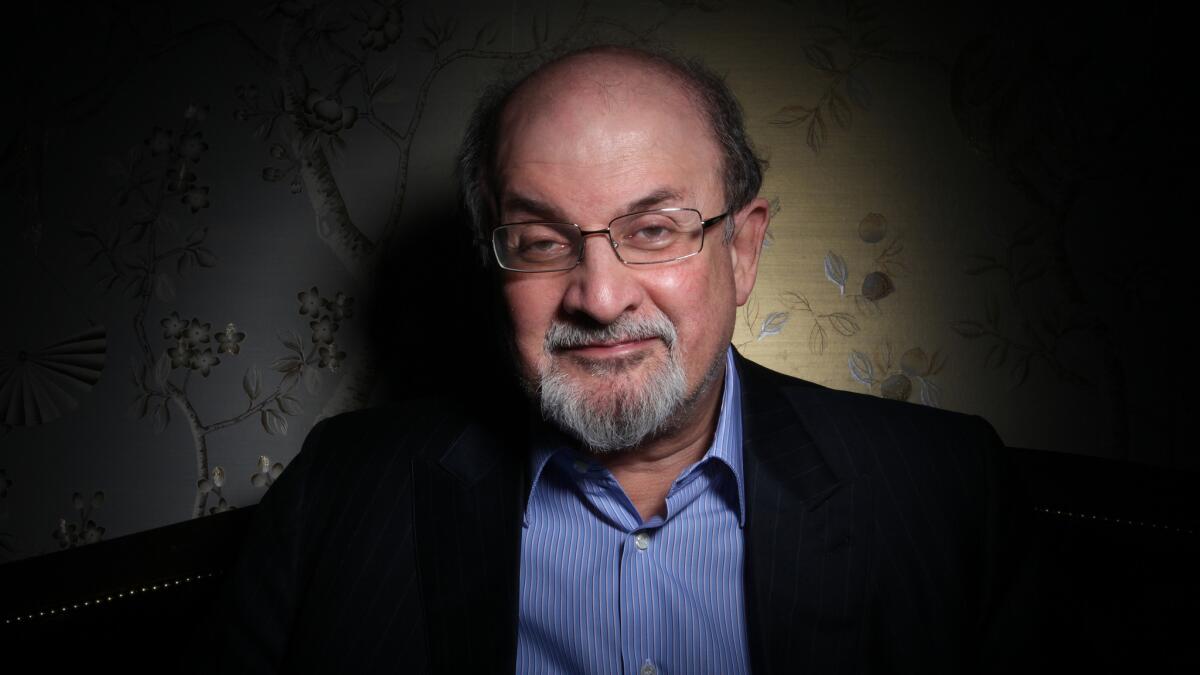
Francine Orr / LA Times
Author Salman Rushdie, who lived in seclusion for almost a decade after Iran's Ayatollah Khomeini called for his death, released a statement following today's attack:
"Religion, a mediaeval form of unreason, when combined with modern weaponry becomes a real threat to our freedoms. This religious totalitarianism has caused a deadly mutation in the heart of Islam and we see the tragic consequences in Paris today. I stand with Charlie Hebdo, as we all must, to defend the art of satire, which has always been a force for liberty and against tyranny, dishonesty and stupidity. ‘Respect for religion’ has become a code phrase meaning ‘fear of religion.’ Religions, like all other ideas, deserve criticism, satire, and, yes, our fearless disrespect."
Editor of controversial magazine among those killed, police union spokesman says
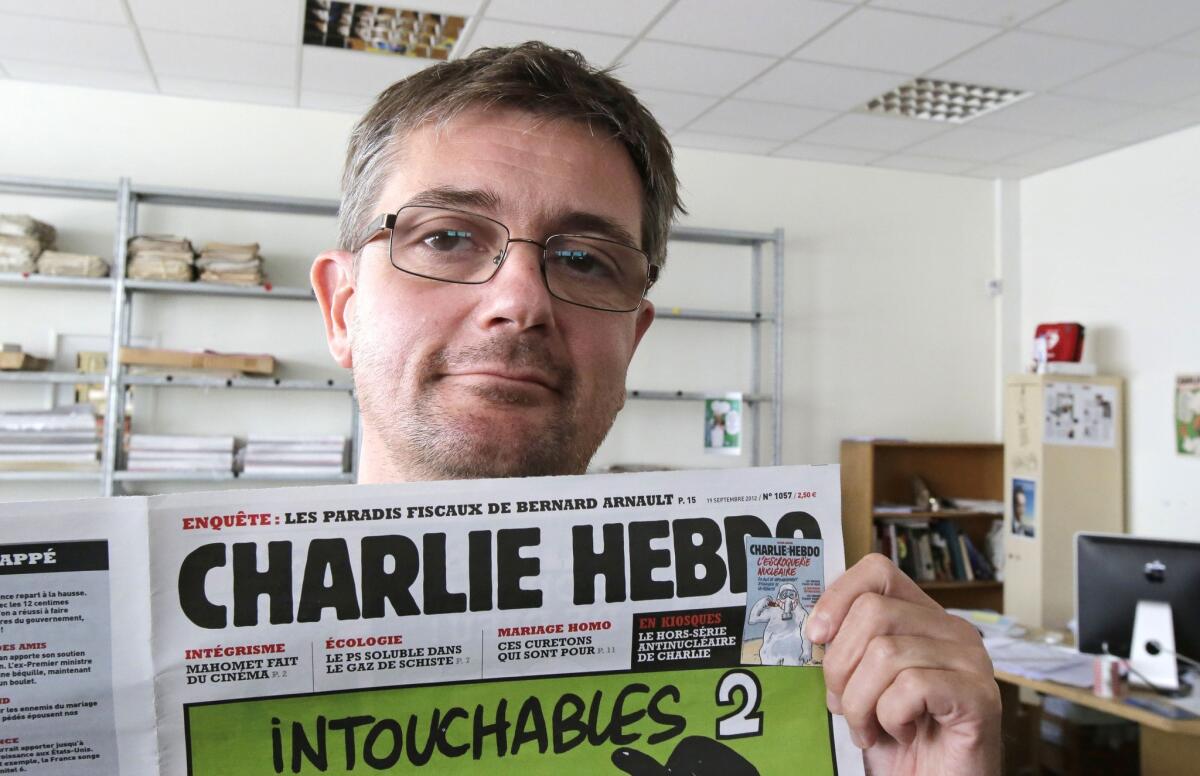
Associated Press
Stephane "Charb" Charbonnier, editor of Charlie Hebdo, was among the 12 people killed in the shooting attack on the magazine's headquarters Wednesday, police union spokesman Christophe Crepin told the Associated Press.
Under Charbonnier's leadership, the magazine courted controversy, often lampooning religious figures of all stripes in its pages. In 2011, the first two floors of its headquarters were damaged after two Molotov cocktails were thrown inside.
Charbonnier spoke to The Times in 2013 about ongoing threats to the magazine for publishing cartoons depicting the Muslim prophet Muhammad.
"It just so happens I'm more likely to get run over by a bicycle in Paris than get assassinated," Charbonnier told The Times.
The editor went on to say that threats from Islamic extremists "come from a very small minority that doesn't necessarily have the means to act."
"If one person is injured or killed, it doesn't mean all of France will be put on its knees," he continued. "It's not Islam attacking France, it's one person attacking another person, that's all."
Charbonnier acknowledged it would have been harder to do his job if he had a family to worry about, due to safety concerns.
But, he said, "If a small group of terrorists, however small it is, starts to dictate its law to newspapers in France or elsewhere, that would really be a shame."
U.S. analysts helping with investigation
U.S. counterterrorism officials are searching databases and checking recorded intercepts for information related to the attack in Paris, a U.S. official said on Wednesday, but analysts have yet to identify individuals or groups responsible for the attack. U.S. officials are aware of social media reports that the gunmen who stormed the offices of Charlie Hebdo in Paris said the prophet Mohammed was “avenged,” the official said, speaking on the condition of anonymity to discuss internal assessments.
The Department of Homeland Security is closely monitoring the attack and will change the security measures inside the U.S. as appropriate, an agency official said, but no changes have yet been made.
Secretary of State John Kerry: 'Each and every American stands with you today'
U.S. Secretary of State John Kerry spoke about the terrorist attack on Charlie Hebdo, assuring France that Americans are standing with them in solidarity.
"I would like to say directly to the people of Paris and of all of France, that each and every American stands with you today, not just in horror or in anger or in outrage for this vicious act of violence, but we stand with you in solidarity and in commitment both to the cause of confronting extremism and in the cause which the extremists fear so much and which has always united our two countries: freedom."
He also stressed that "free expression and a free press are core values" and that they can be attacked, but they cannot be eradicated.
"[The terrorists] may wield weapons, but we in France and in the United States share a commitment to those who wield something that is far more powerful. Not just a pen, but a pen that represents an instrument of freedom, not fear."
He concluded his remarks restating that freedom of expression will continue, despite acts of terror.
"The murderers dared proclaim Charlie Hebdo is dead, but make no mistake, they are wrong," he said. "Freedom of expression it represented is not able to be killed by this kind of act of terror. On the contrary, it will never be eradicated by any act of terror. What these people who do these things don’t understand is they will only strengthen the commitment to that freedom and our commitment to a civilized world."
NYPD on Paris attacks
Following the attack in Paris, NYPD's Commissioner William Bratton looked to assure New Yorkers that there's no immediate threat to the city.
John Kerry speaking on attack
#Jesuischarlie and other outpourings of support flow on social media
Shortly after a brutal attack on a satirical magazine in Paris, #jesuischarlie or “I am Charlie” began trending on social media. Twitter and Instagram users from around the world took to their accounts to stand in solidarity over the attack.
On Instagram, more than 20,000 posts were shared using the hashtag #jesuischarlie.
On Twitter, many are sharing a black colored box with the words “Je Suis Charlie” written in white.
Or the same words on Twitter, with a photo of someone holding a gun and another person holding up a pencil.
Users an ocean away from Paris expressed their support in an echo of French support that was offered to the U.S. on Sept. 11, 2001.
They tweeted the cover Charlie Hebdo published in 2011 following a firebomb attack on its offices.The cover depicted a Muslim man kissing a cartoonist.
Other users, like the U.S. Embassy France, changed Twitter avatars to the words “Je suis Charlie."
France's President Hollande calls attack 'an act of exceptional barbarity'
French President Francois Hollande visited the scene soon after the shooting Wednesday afternoon. Speaking to reporters, Hollande described the incident as "a terrorist attack without a doubt."
Hollande later tweeted, "No barbaric act will never extinguish the freedom of the press."
Tweets from the Elysee, Hollande's official residence, showed the president holding an emergency meeting Wednesday with top ministers.
The Elysee also posted a photo of flags being flown half-mast in honor of the victims.
How the attack unfolded
According to authorities, hooded gunmen drove up to the offices of Charlie Hebdo around 11:40 a.m.
They entered the building and shot and killed a police officer who was on guard.
The gunmen then went up to the second and third floor editorial offices and shot at staff, killing 10 of them.
They shot another police officer as they ran out. As he lay writhing on the ground, they ran back and one of the gunmen shot him again in the head.
At least five others were reported seriously injured.
--Kim Willsher
Response from British PM David Cameron
Apparent video of the gunmen during the attack
The BBC has aired video apparently captured during the attack. Warning: Some of the images are disturbing.
French officials say there were 3 gunmen
'A newspaper is not a weapon of war'
President Obama's full statement on attack
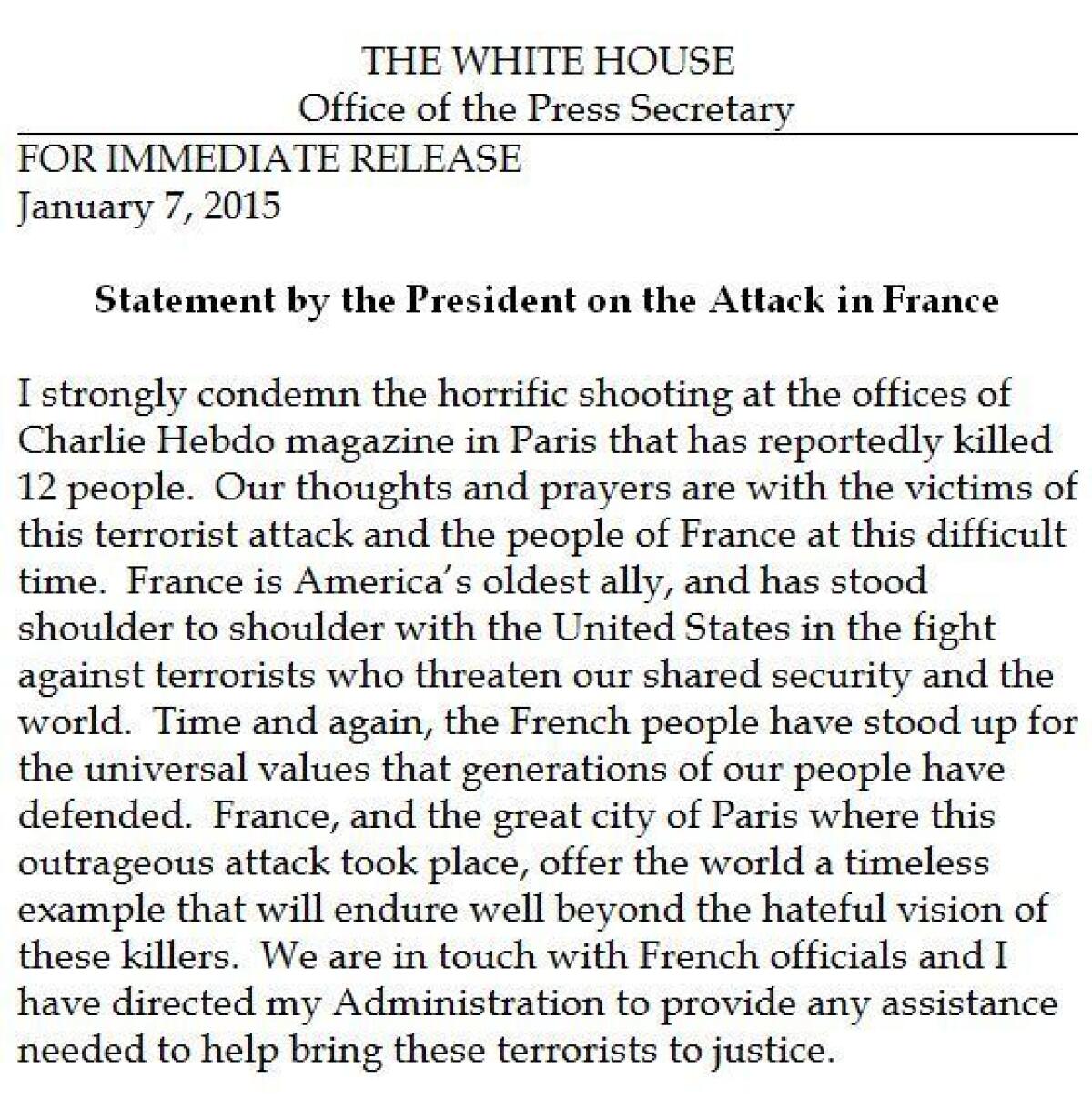
White House response
Basics of the attack so far
-- Gunmen attacked the offices of Charlie Hebdo, a French satirical magazine frequently criticized by Muslims.
-- French officials have said up to 12 people died in the attack.
-- France has raised its terror alert to the highest level.
-- It's not yet clear how many gunmen were involved in the attack, and they are still being sought by law enforcement.
Sign up for Essential California
The most important California stories and recommendations in your inbox every morning.
You may occasionally receive promotional content from the Los Angeles Times.
